An extraordinary array of eminent achievers gathered in Washington, D.C., for the 54th International Achievement Summit in September and December of 2022.
After a two-year hiatus because of the Covid-19 pandemic, the American Academy of Achievement inducted three new members at an intimate dinner and awards ceremony held at the Hotel Bel-Air in Los Angeles, California, in mid-December of 2021. The awards ceremony was hosted by Academy Awards Council member and Nobel Prize laureate Dr. Frances Arnold and Catherine B. Reynolds, the Founder and Chairman of the Catherine B. Reynolds Foundation.
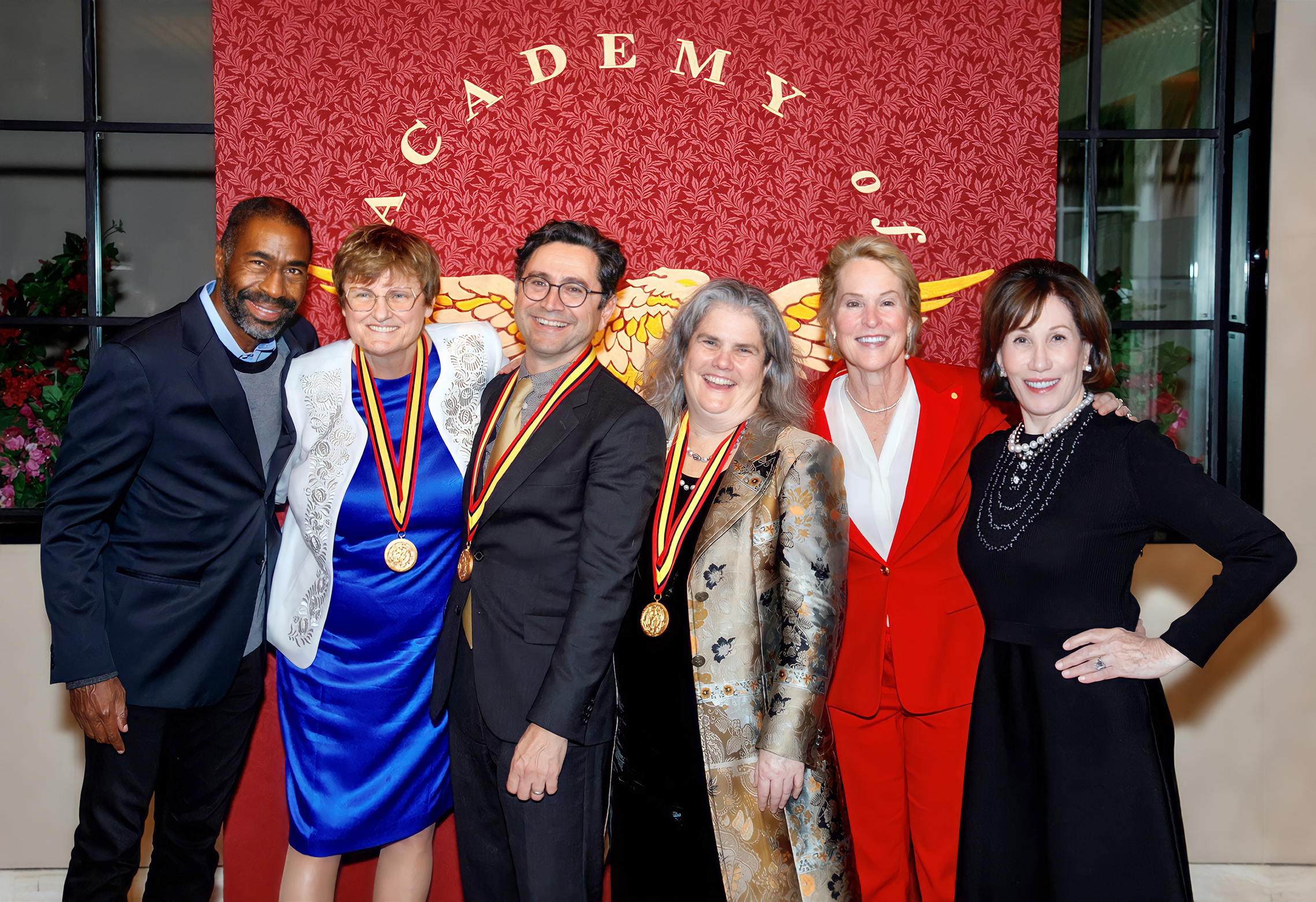
Dr. Arnold introduced the honorees and summarized their accomplishments. The Golden Plate Award was presented to Dr. Andrea M. Ghez for “unlocking the secrets of the universe” by locating a massive black hole in the heart of the Milky Way, which earned her the Nobel Prize in Physics.
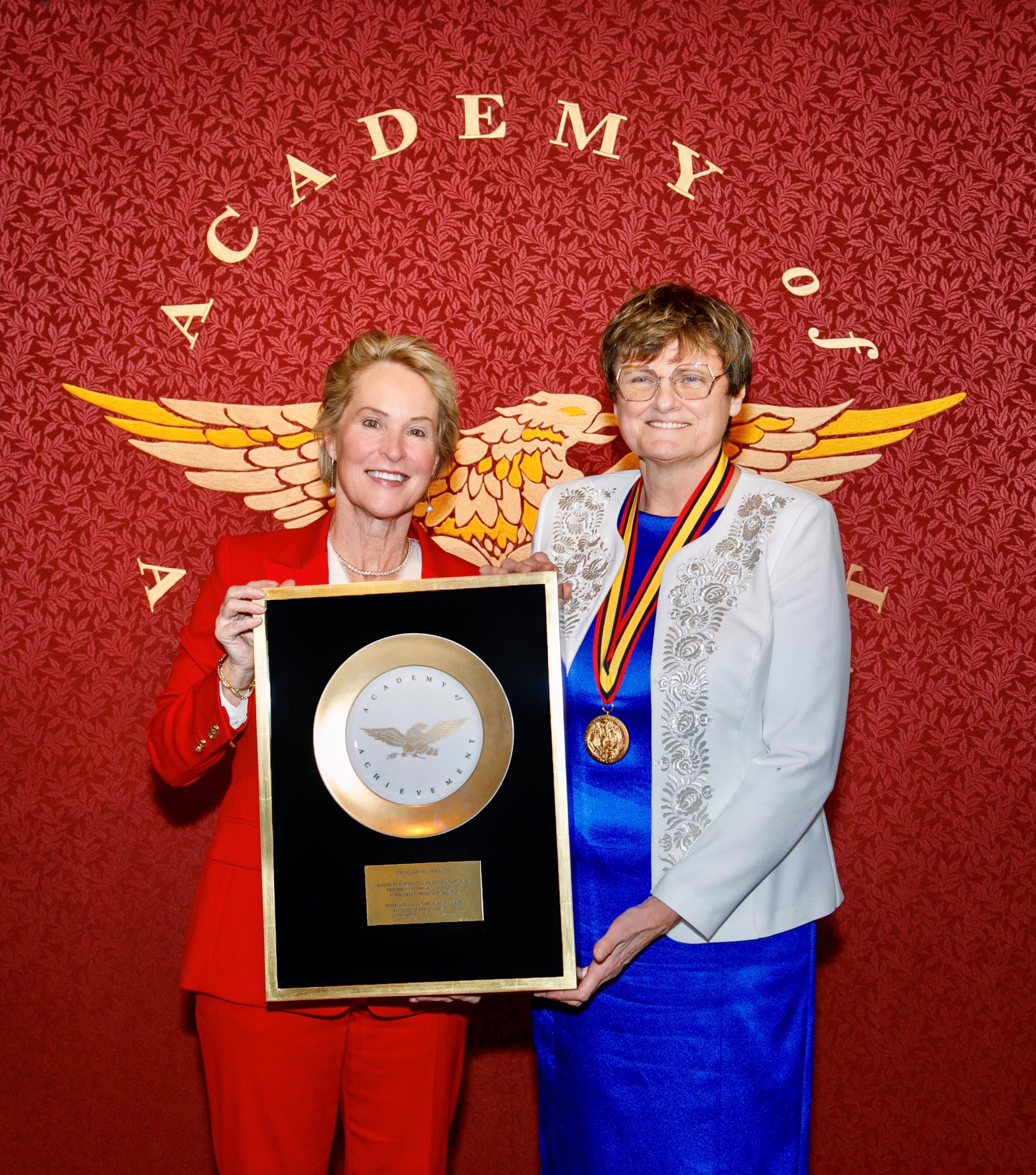
The Golden Plate was presented to Dr. Ardem Patapoutian for “identifying the previously unknown class of proteins in living cells that register pressure” – the sense of touch – which was recognized by the 2021 Nobel Prize in Medicine, and Dr. Katalin Karikó for developing messenger RNA vaccines that prevented more than 10 million hospitalizations and saved over 2 million lives during the recent Covid-19 pandemic, and earned her the 2021 Lasker Award for medical research, the highest honor in American medicine.
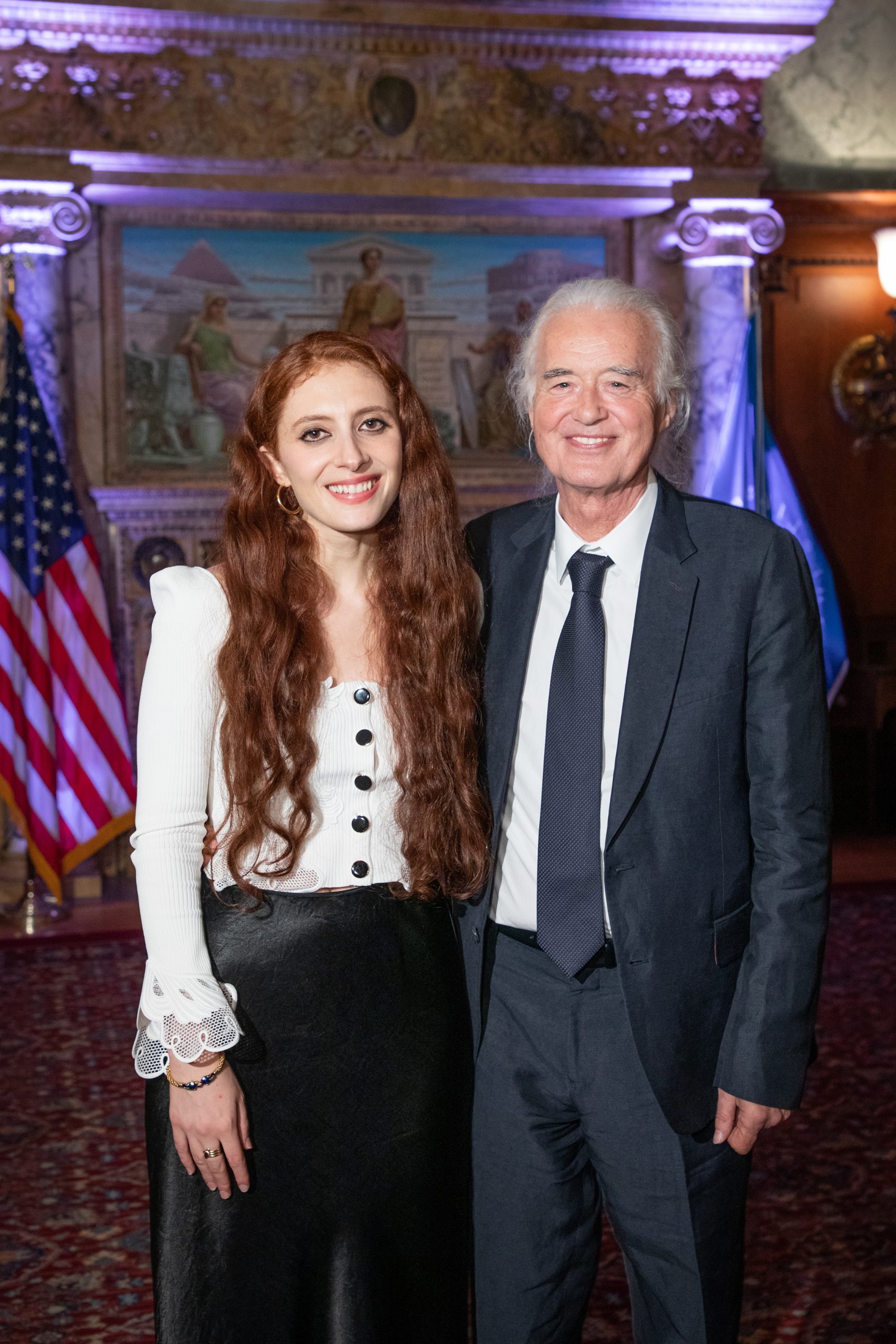
The three honorees responded at the awards presentation ceremony by enthralling the Academy members on the long journey and personal perseverance that led to their breakthrough discoveries after decades of doubt and resistance within the scientific community.
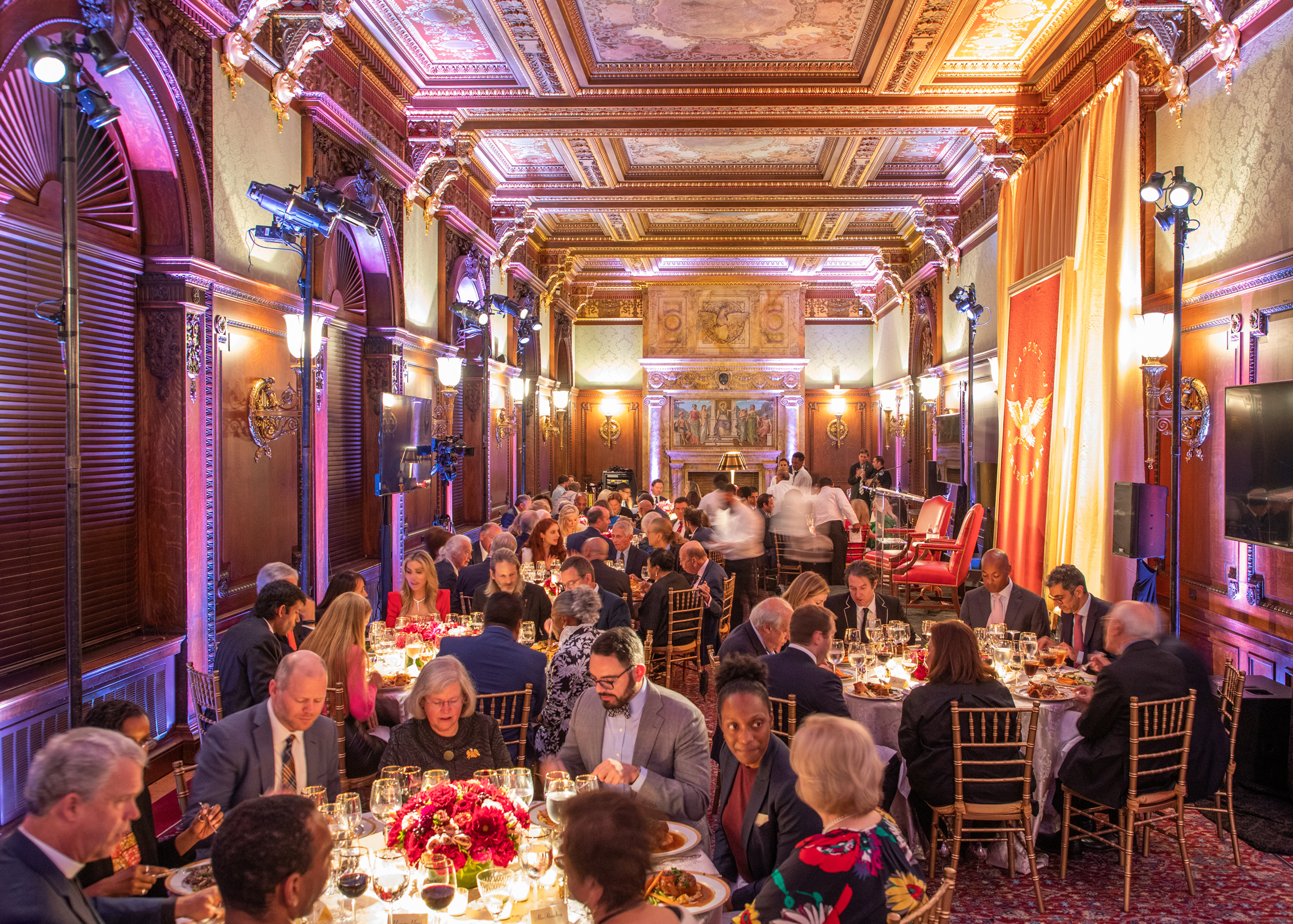
The 2022 Achievement Summit was held in Washington, D.C., and began with a dinner and presentation in the historic Members Room at the Library of Congress on September 9, hosted by Academy member and Librarian of Congress Carla Hayden and Catherine B. Reynolds. Carla Hayden welcomed the Academy members and guests, including the new class of White House Fellows, to the dinner. The ceremony’s highlight was a multimedia presentation on creativity by Academy member Jimmy Page, the legendary guitarist and founder of Led Zeppelin and poet and performer Scarlett Sabet, on their spoken word album Catalyst.
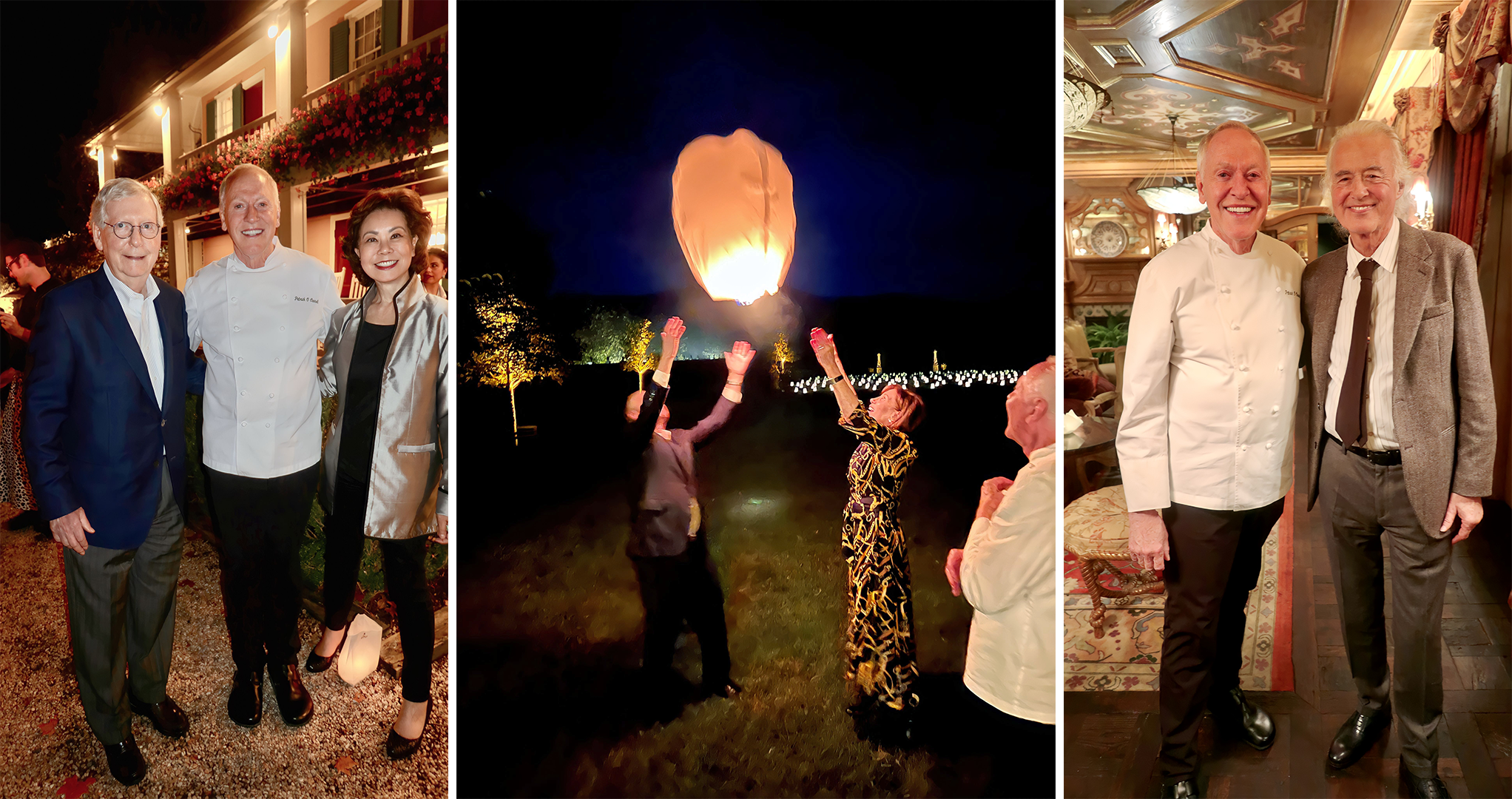
The album was written and performed by Scarlett Sabet and produced by Jimmy Page to “emphasize the power of the spoken word in the context of poetry and present her work in a radical form.” A question-and-answer session followed the dinner. Among the Academy members in attendance were Dr. Francis Collins, Dr. Anthony Fauci, Dr. Steven Rosenberg, Martine Rothblatt, and Steve Case.

The Summit program continued with a dinner in honor of Jimmy Page at The Inn at Little Washington, prepared by famed chef and proprietor Patrick O’Connell. The Inn, which exemplifies culinary excellence, is situated in the Virginia countryside in the foothills of the Blue Ridge Mountains near Shenandoah National Park.
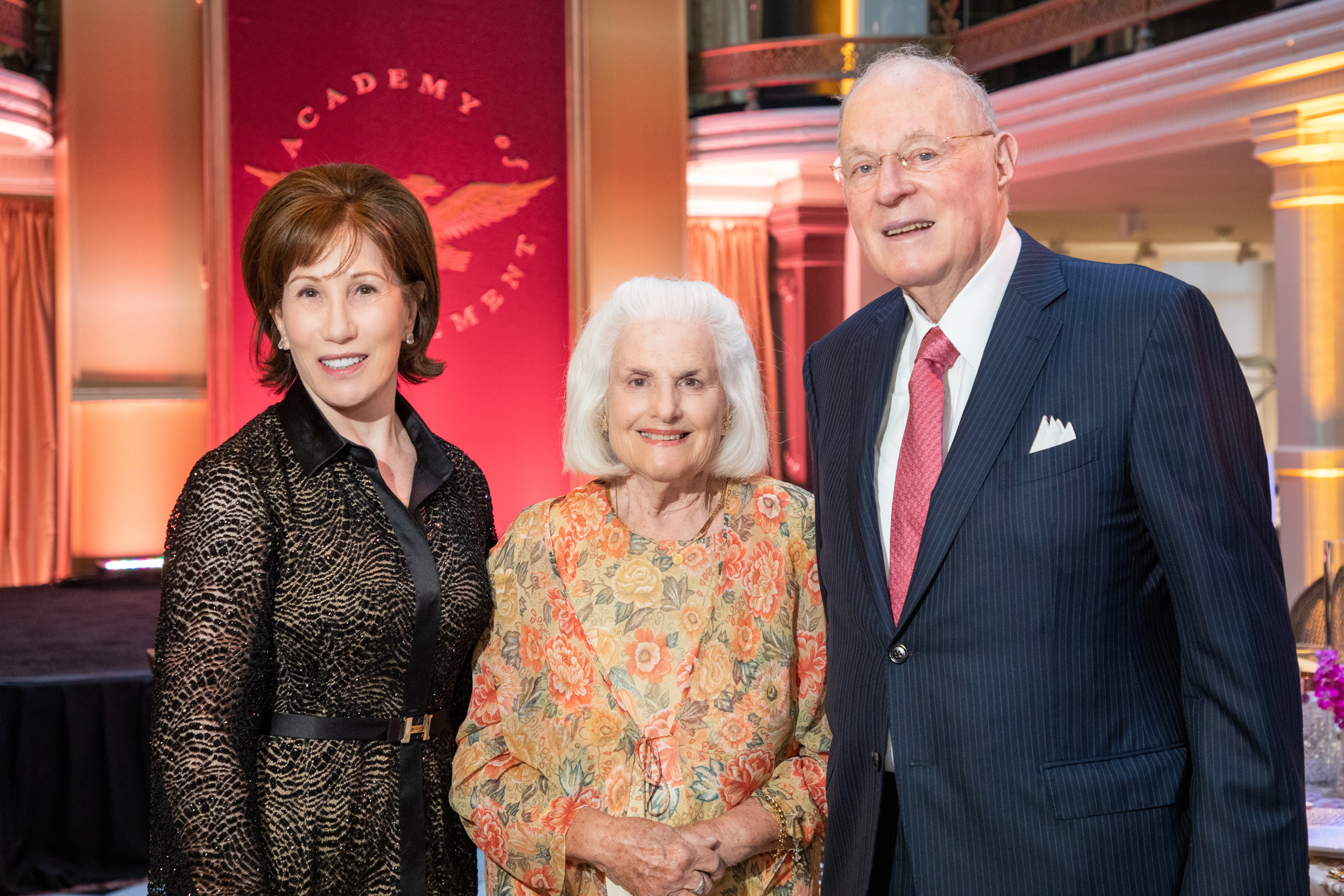
The Banquet of the Golden Plate ceremonies were held in the historic Luce Library of The Smithsonian’s National Portrait Gallery in Washington, D.C. The Academy members enjoyed a reception in The Great Hall, the location of President Abraham Lincoln’s second inaugural ball on March 6, 1865. The ball took place as Lincoln’s second term began, with the Civil War in its final stages, and only six weeks before Lincoln was assassinated at nearby Ford’s Theatre.
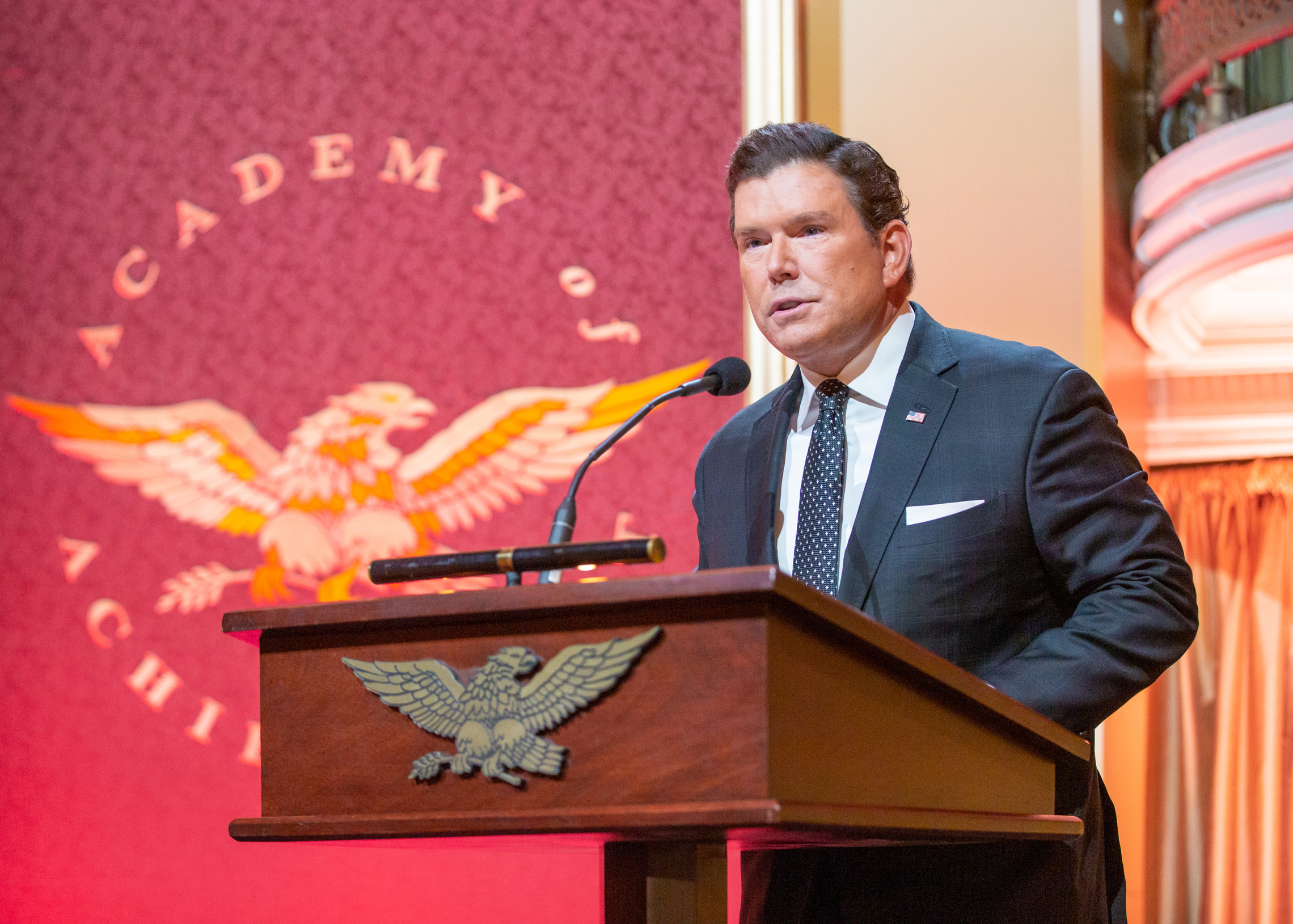
Catherine B. Reynolds, the Summit Host, opened the Banquet ceremonies, invoking the memory of President Lincoln, perhaps the greatest President in our nation’s history. Catherine Reynolds concluded her welcoming remarks by stating, “Tonight, in honor of President Lincoln’s example, his vision, his hope, his determination, we celebrate the power of individual achievement.”
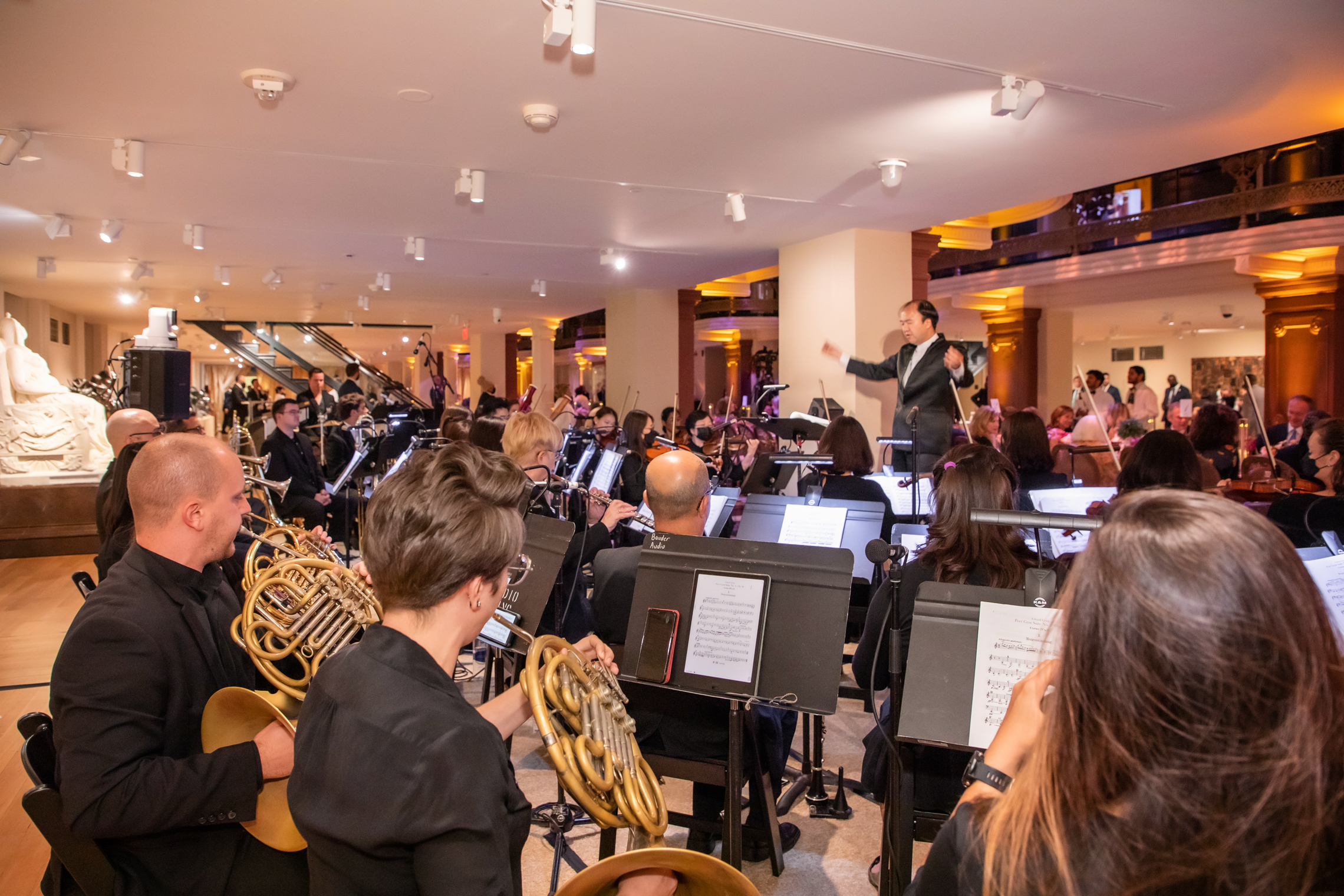
The Academy guests were serenaded by the Washington Chamber Orchestra as they watched a video presentation summarizing the extraordinary achievers who have participated in the Banquet of the Golden Plate ceremonies over the past six decades.
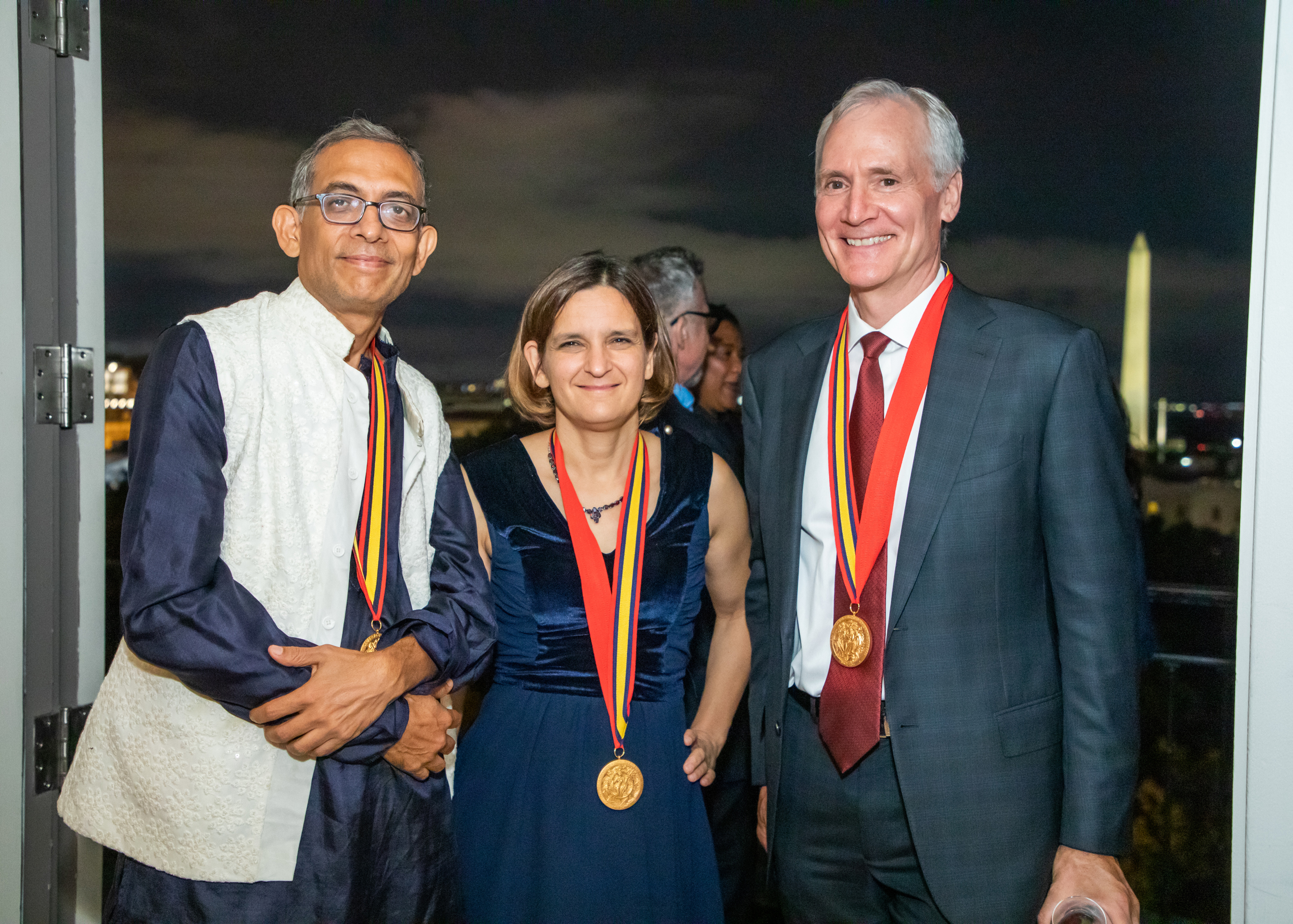
The Banquet Awards presentations were moderated by broadcast journalists Wolf Blitzer of CNN and Bret Baier of Fox News.
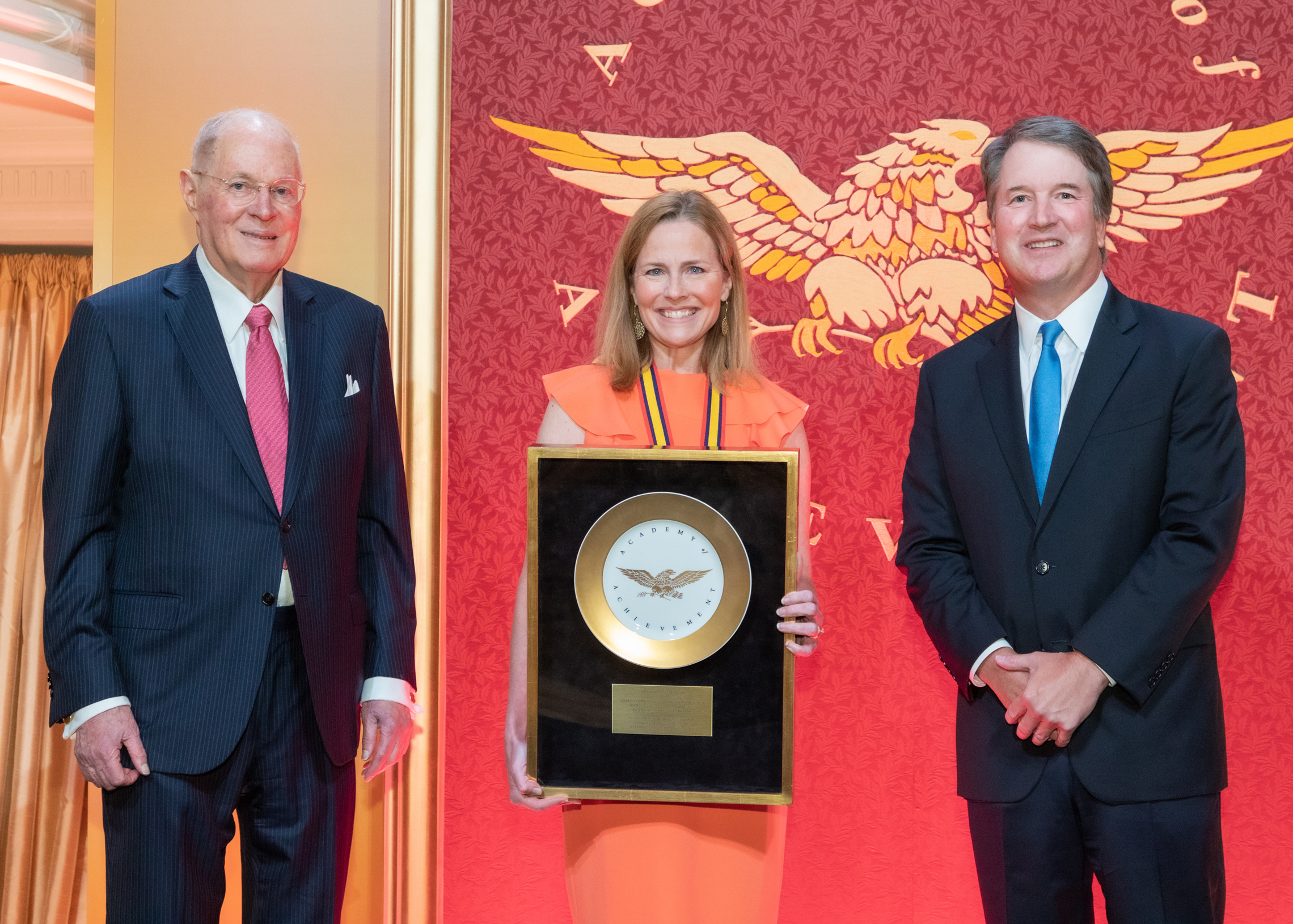
The first Academy inductees of the evening were the husband-and-wife economists from MIT, Dr. Abhijit Banerjee, and Dr. Esther Duflo, who earned the Nobel Prize for their approaches to alleviating global poverty. Their Golden Plate was presented by Academy members Anthony Romero and Dr. Martin Rothblatt.
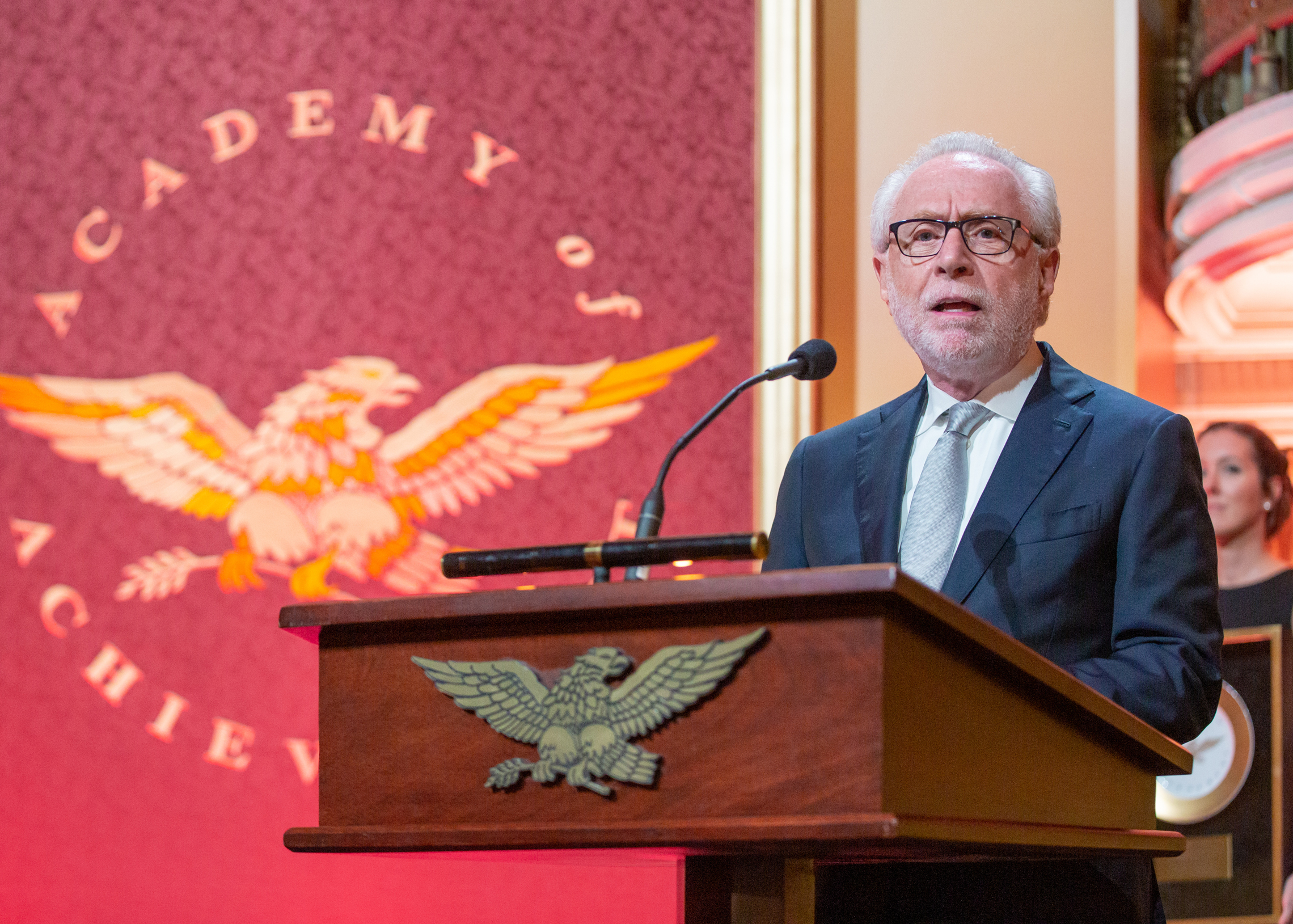
Justice Anthony Kennedy and Justice Brett Kavanaugh presented the Golden Plate Award to Justice Amy Coney Barrett. Her Academy introduction recognized “her sharp intellect and deep faith” as the fifth woman to serve on the United States Supreme Court.
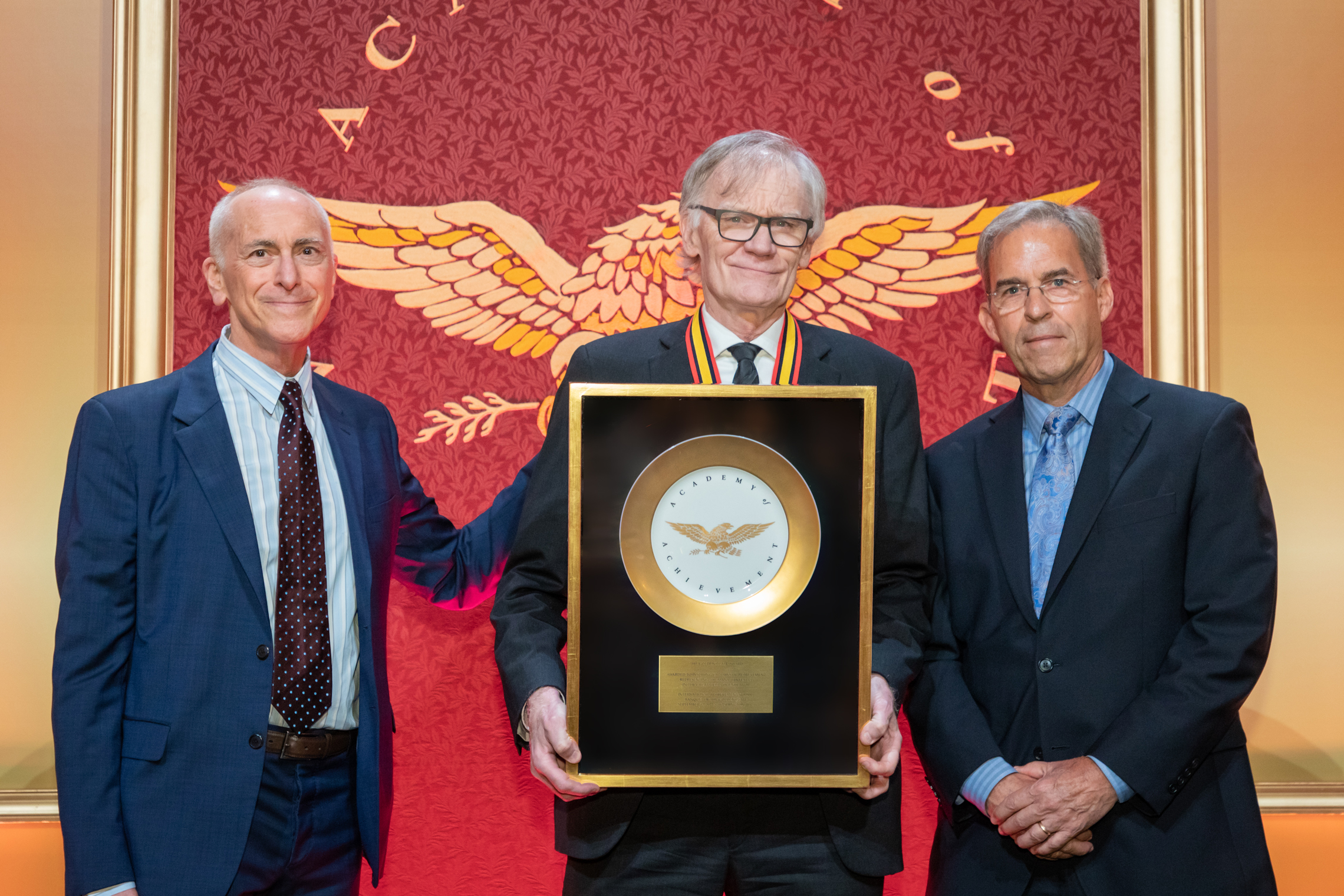
Pulitzer Prize recipient and Yale Professor of History David Blight was presented with his Golden Plate Award by Academy members and Pulitzer Prize historians A. Scott Berg and Rick Atkinson. Professor Blight was lauded by the Academy for “devoting himself to the study of the abiding questions of our national memory – slavery, abolition, Civil War, civil rights and Reconstruction.”
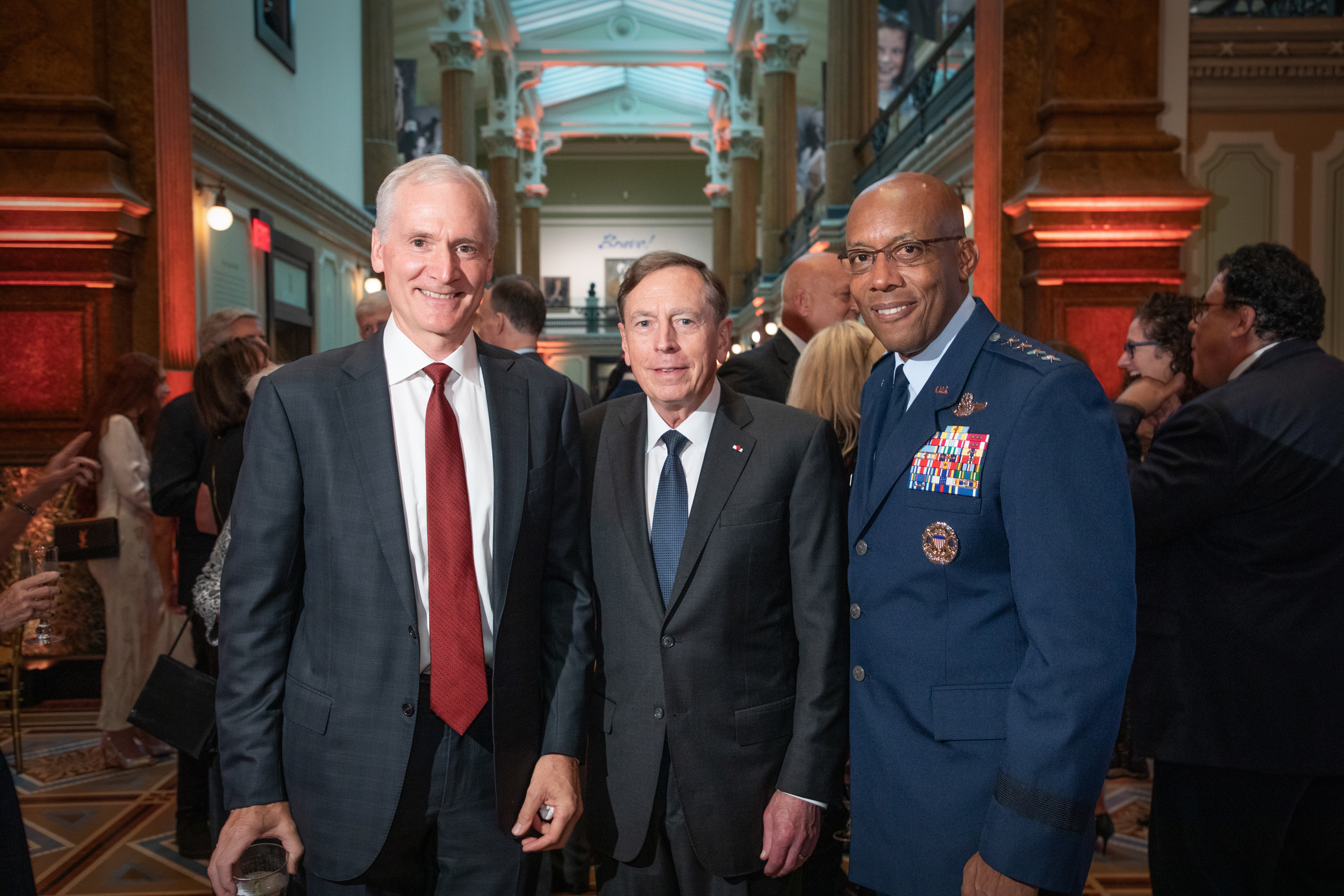
The fourth Golden Plate Award was presented to General Charles Q. Brown, USAF, the first African American to be Air Force Chief of Staff and to lead any branch of the U.S. Armed Forces. The induction into the Academy was made by General Joseph W. Ralston, USAF, former Supreme Allied Commander Europe.
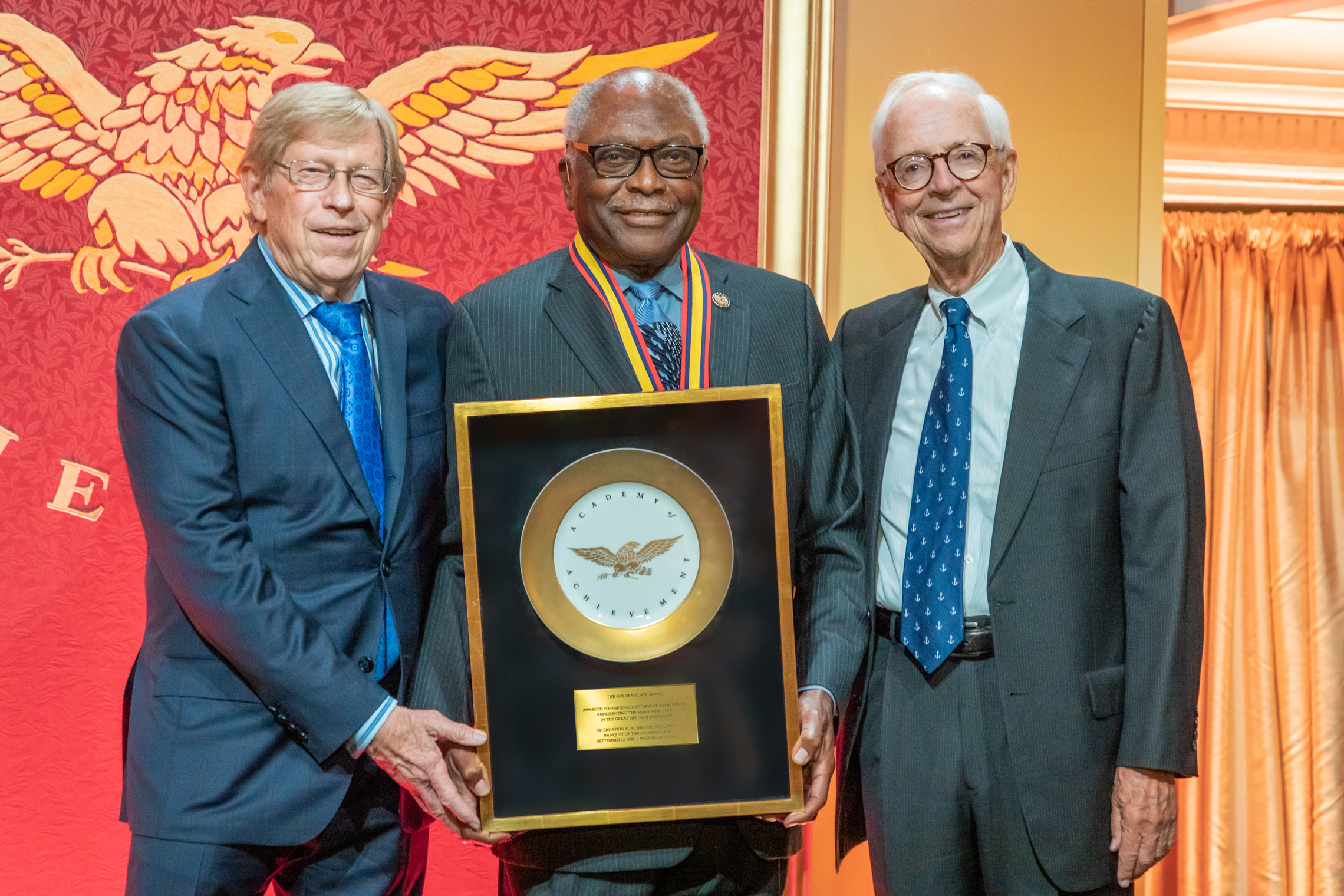
Congressman Jim Clyburn received the next Golden Plate Award in tribute to his 15 terms in the U.S. Congress as a beacon for justice, opportunity, and public service, most recently as The House Majority Whip. The Golden Plate was presented by Awards Council members and legendary defense counsels Brendan V. Sullivan and Theodore Olson.
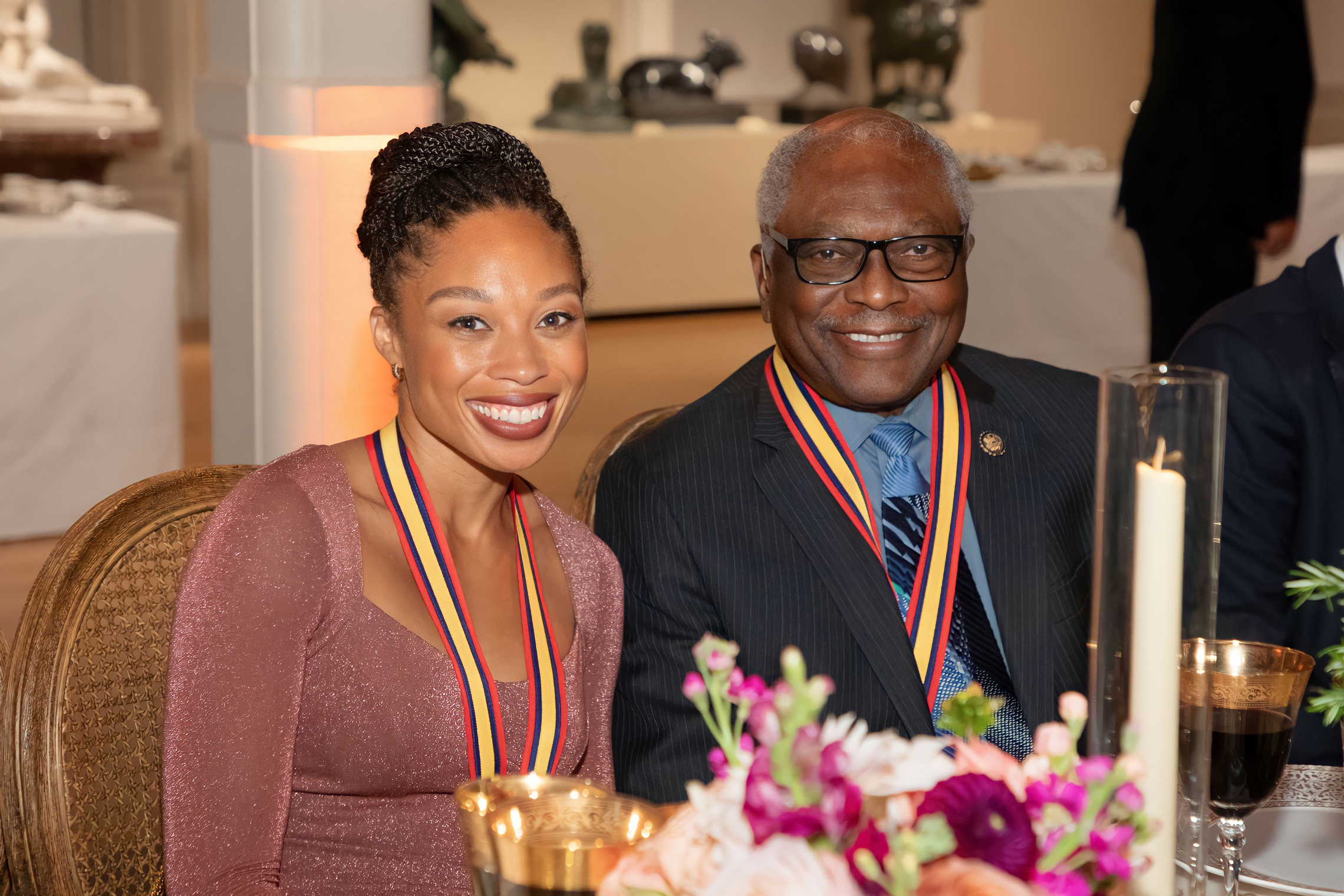
The evening’s sixth Golden Plate was presented to eleven-time Olympic medalist Allyson Felix in recognition of her extraordinary career on and off the track. As the most decorated American track and field athlete in Olympic history. Allyson Felix “lends her voice to speak out on the Black mortality rate and the inequalities facing Black pregnant women.” The Golden Plate was presented by Awards Council member Dr. Benjamin Carson.
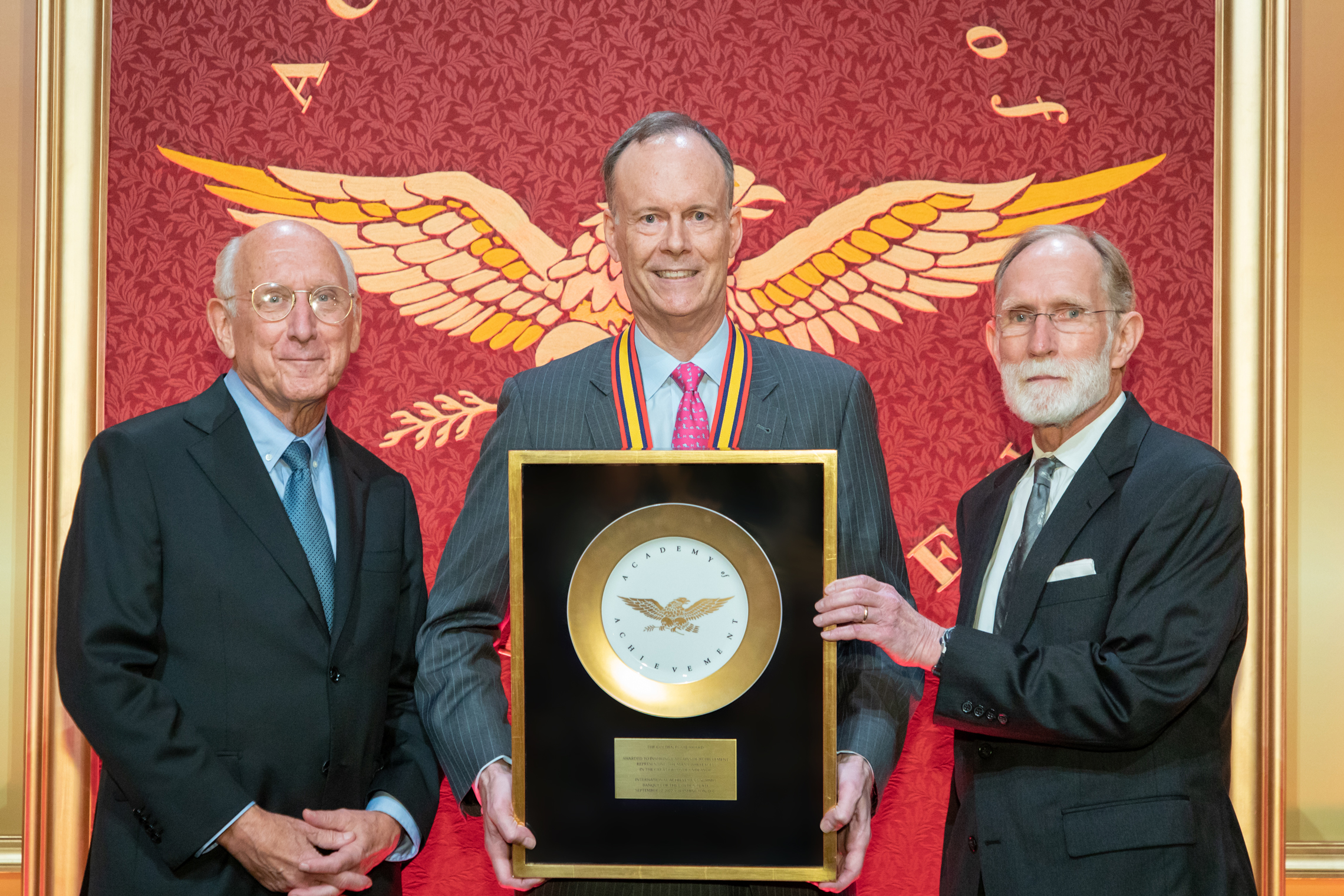
Dr. William G. Kaelin, Jr. was recognized by the Academy for research on “how cells serve and adapt to oxygen availability which may lead to new treatments for diseases like cancer.” Dr. Kaelin, a Harvard Professor of Medicine, has earned many honors, including the Nobel Prize in Medicine. His award was presented by Nobel laureate Dr. Peter Agre and Dr. Steven A. Rosenberg, Chief of Surgery at the National Cancer Institute.
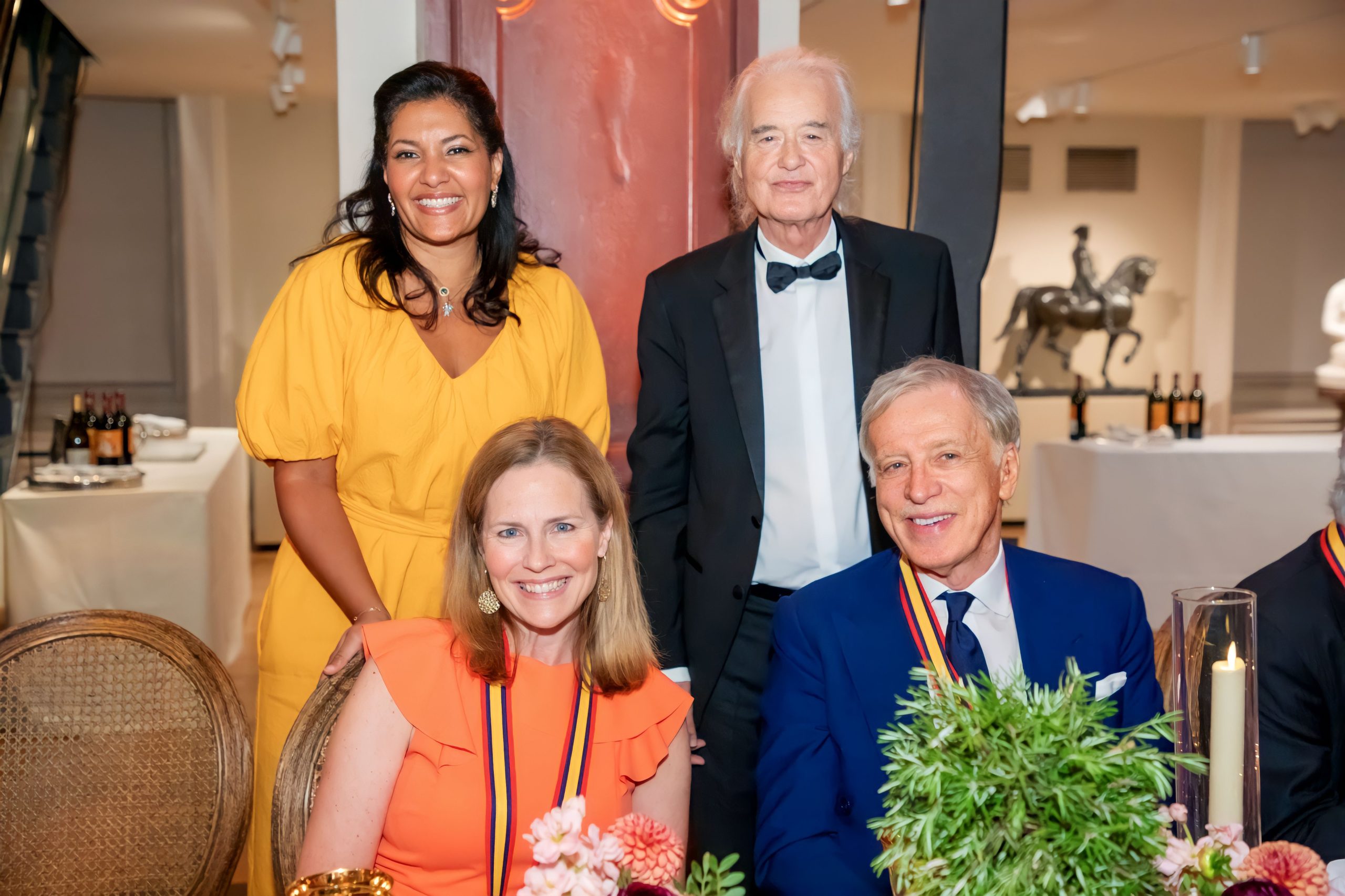
Entrepreneur and sportsman E. Stanley Kroenke was presented the Golden Plate Award as a successful real estate developer and owner of the Los Angeles Rams, 2022 Super Bowl Champions, and the Colorado Avalanche, 2022 Stanley Cup hockey champions. Stan Kroenke’s award was bestowed by Awards Council member Jimmy Page, founder of Led Zeppelin.
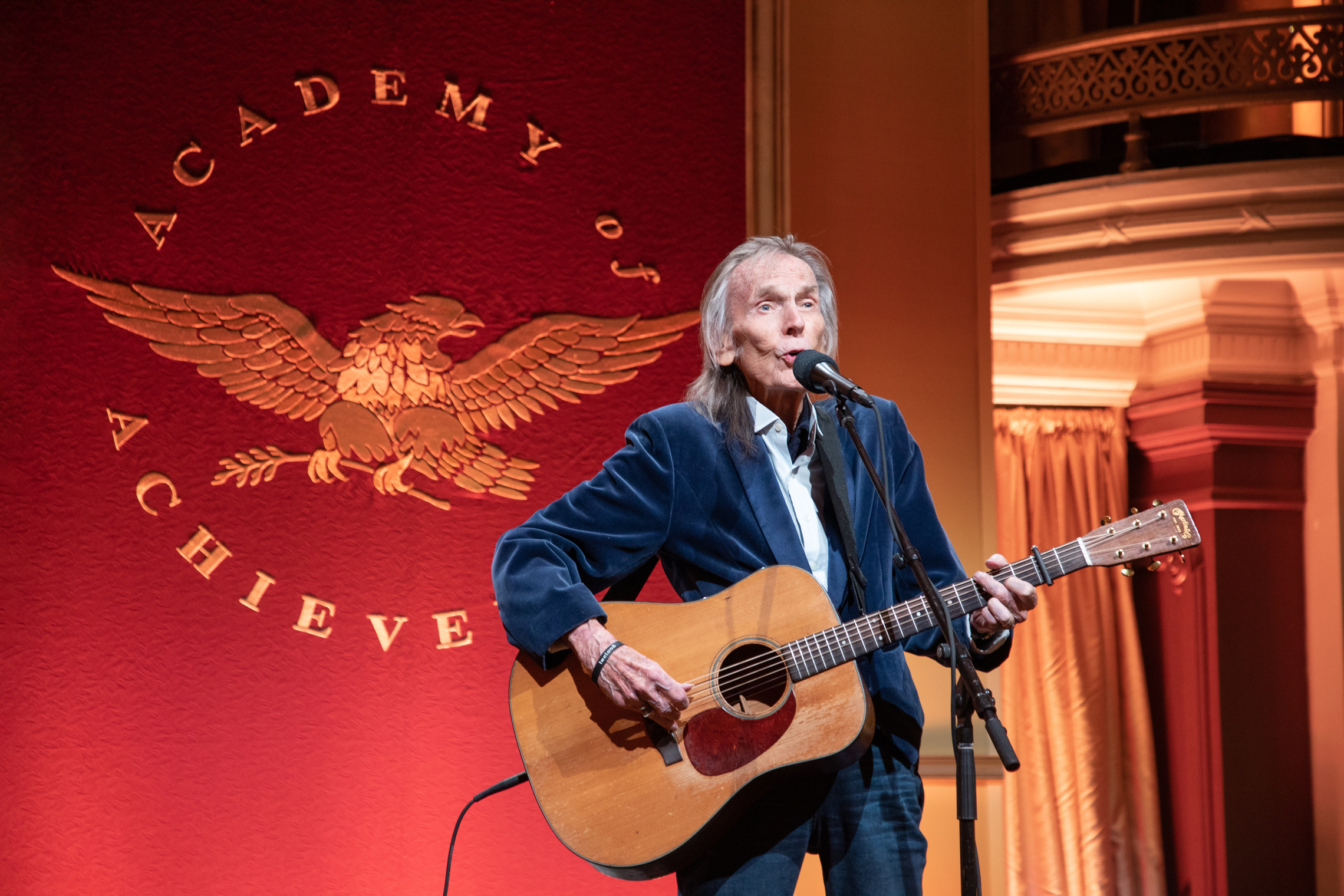
The ninth award of the evening was extended to the internationally acclaimed singer and songwriter Gordon Lightfoot. You can hear the rhythm and the longing in his lyrics. The award was presented by Dr. Andrew Weil. Gordon Lightfoot went on to perform his iconic song “If You Could Read My Mind” for the Academy guests, accompanied by the Washington Chamber Orchestra.
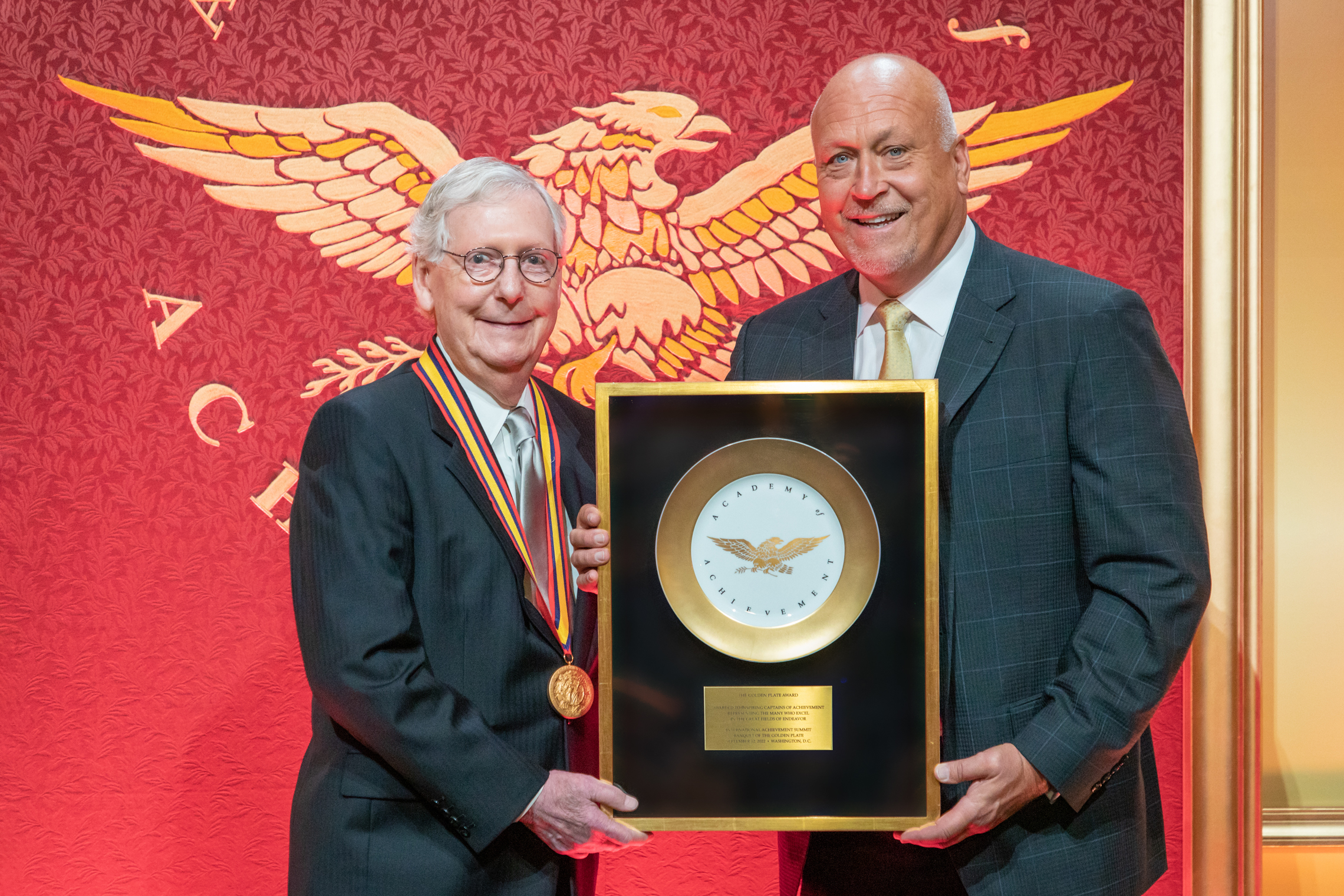
U.S. Senator Mitch McConnell was presented the Golden Plate Award as Kentucky’s longest-serving senator with a record seven terms and the Senate Republican Leader. Awards Council member Cal Ripken, Jr., legendary Baltimore Orioles shortstop and Baseball Hall of Fame inductee, bestowed the award.
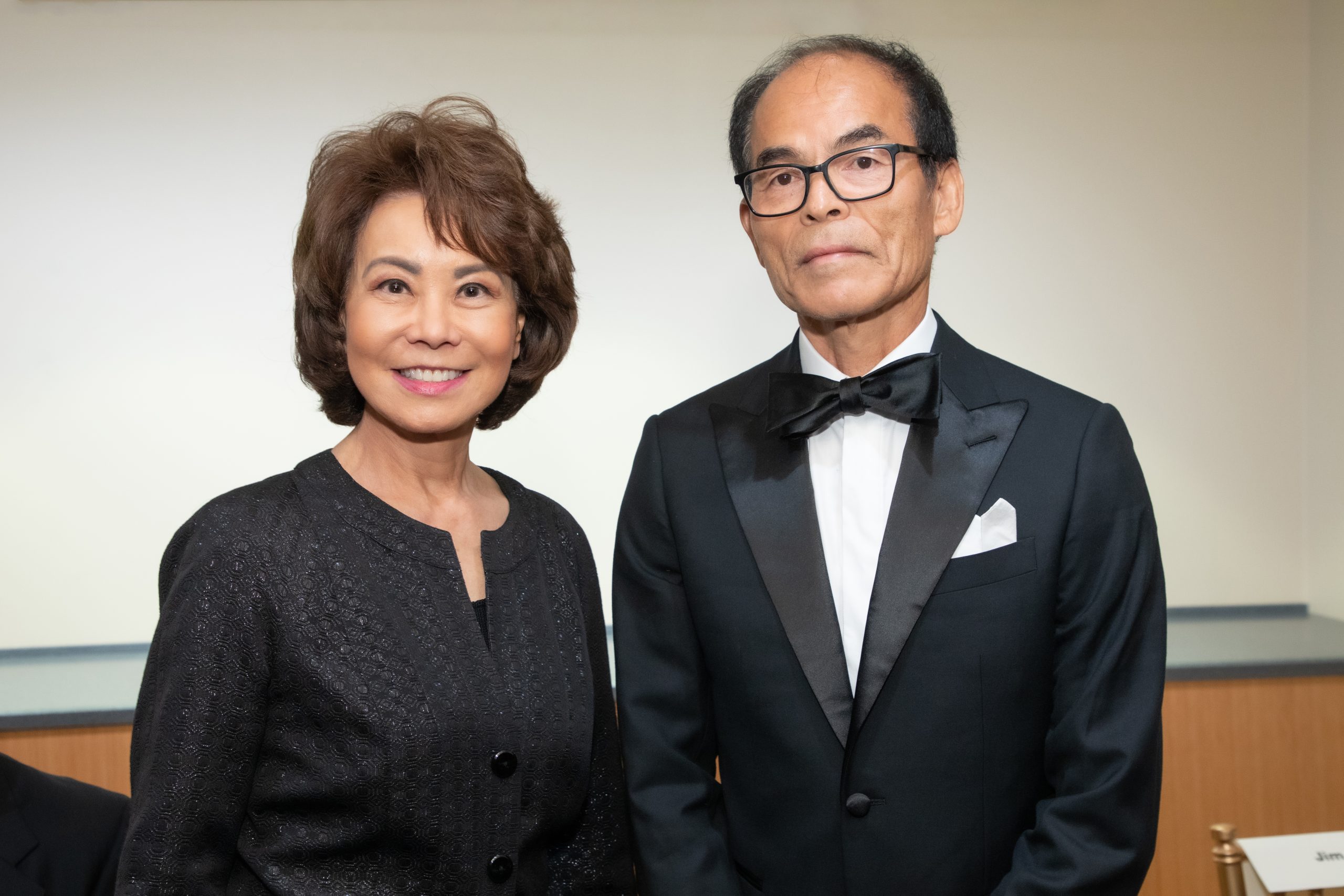
Nobel Prize winner in Physics, Dr. Shuji Nakamura, earned his Golden Plate Award as “the inventor of the blue LED, the breakthrough that led to the power-efficient screens used in television, computer monitors and smartphones.” His award was presented by Academy member and former U.S. Transportation Secretary Elaine Chao.
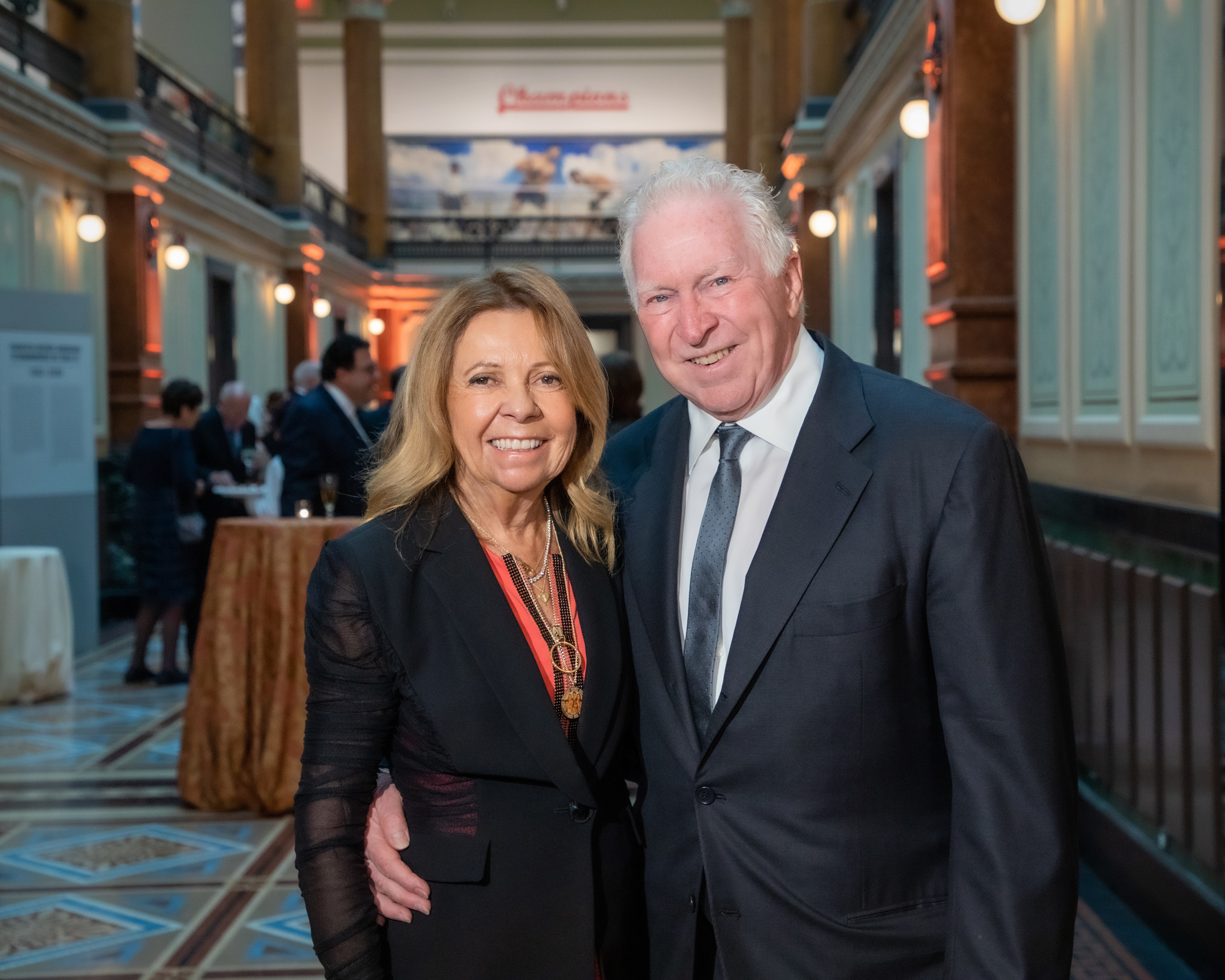
Awards Council members and Academy Patrons Jim Breyer and Lee Ainslie presented the twelfth Golden Plate of the evening to entrepreneur and philanthropist Terry Ragon.
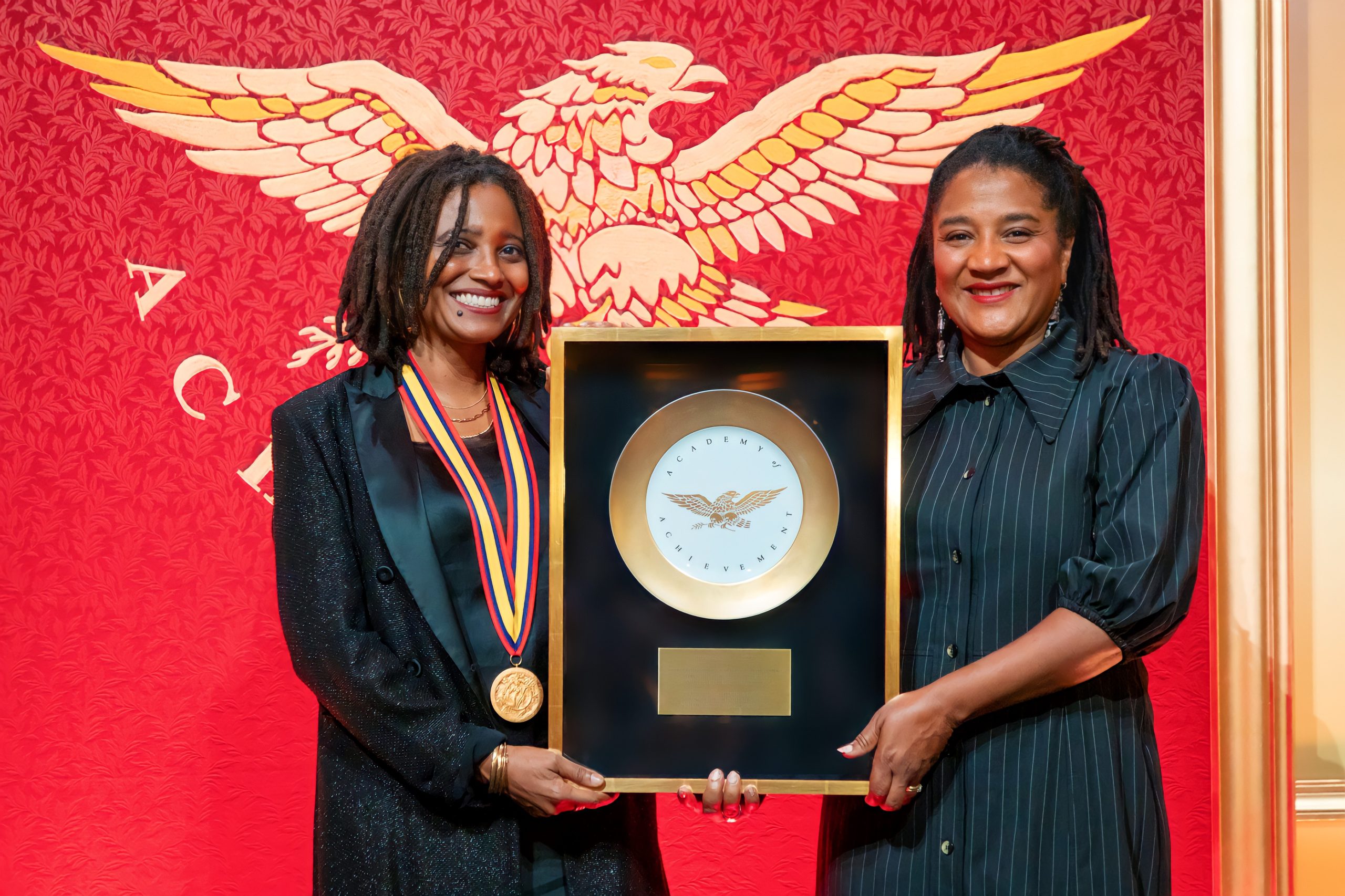
Tracy K. Smith, Pulitzer Prize-winning poet and two-time Poet Laureate of the United States, received her Golden Plate from Awards Council member Lynn Nottage, recipient of two Pulitzer Prizes for Drama.
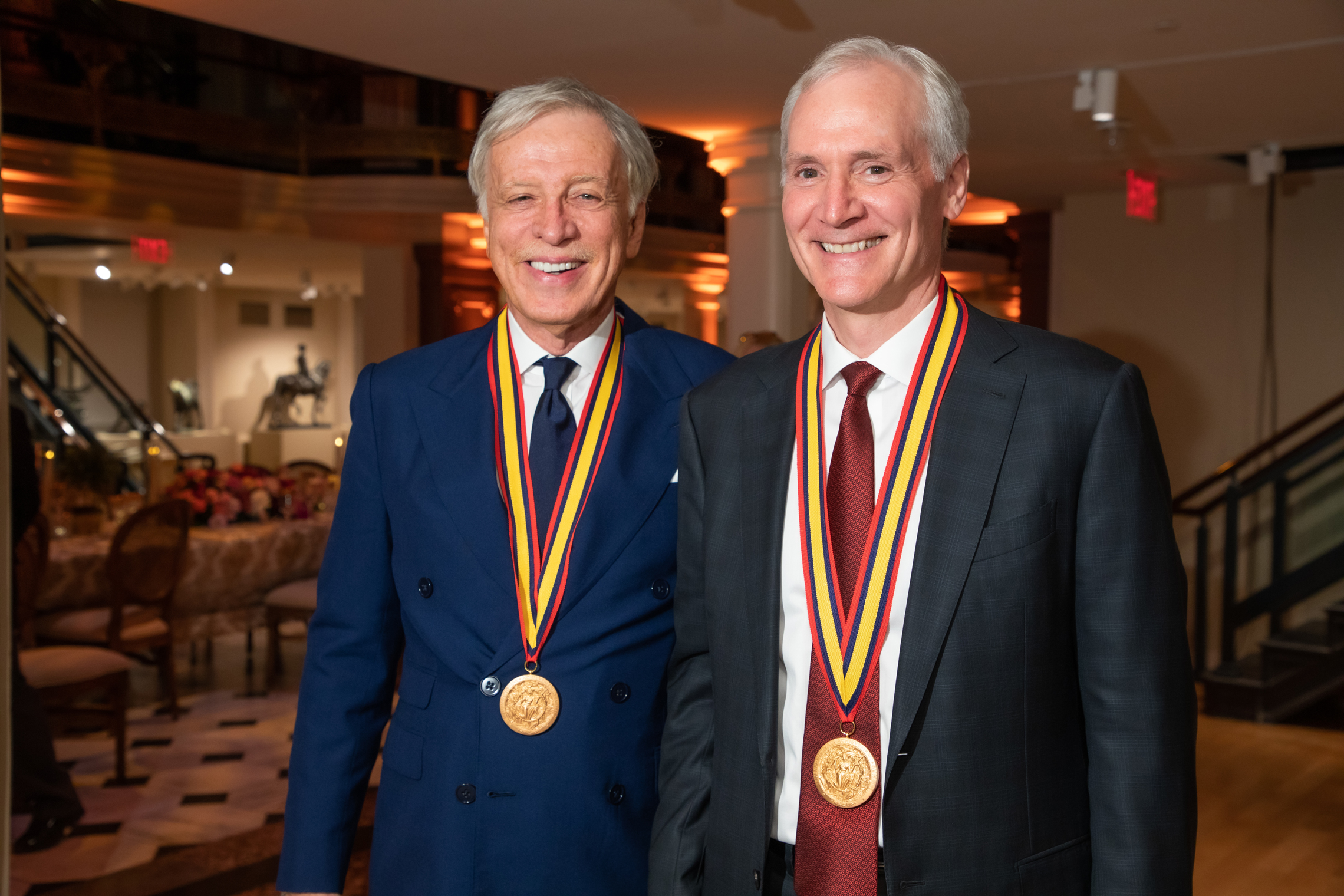
Awards Council member Justice Anthony Kennedy returned to the stage for the presentation of the Golden Plate Award to Dr. Marc Tessier-Lavigne, President of Stanford University. His award citation read: “His mind and abilities are wide-ranging. From an eminent professor in the study of brain development and repair…to biotech executive overseeing 1,400 scientists…to the leader of one of the world’s most renowned universities, he is charged with the electricity of ideas and thoughts.”
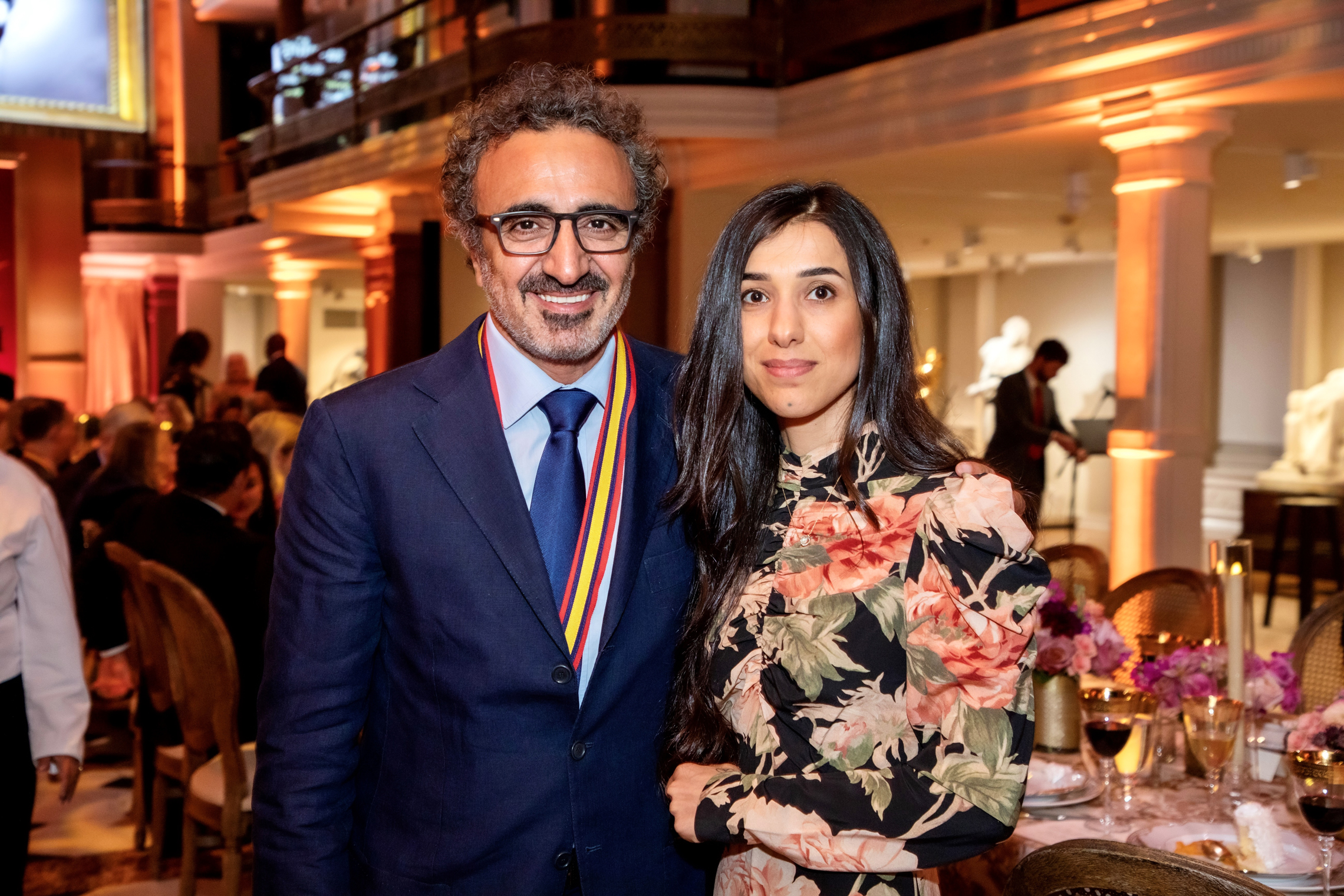
The 15th award of the program was given to Hamdi Ulukaya, the founder and chairman of Chobani. The developer of America’s leading Greek yogurt, he popularized this style of yogurt in the United States. Also a champion of humanitarian efforts for refugees, his honor was presented by Awards Council member Nadia Murad, recipient of the Nobel Prize for Peace.
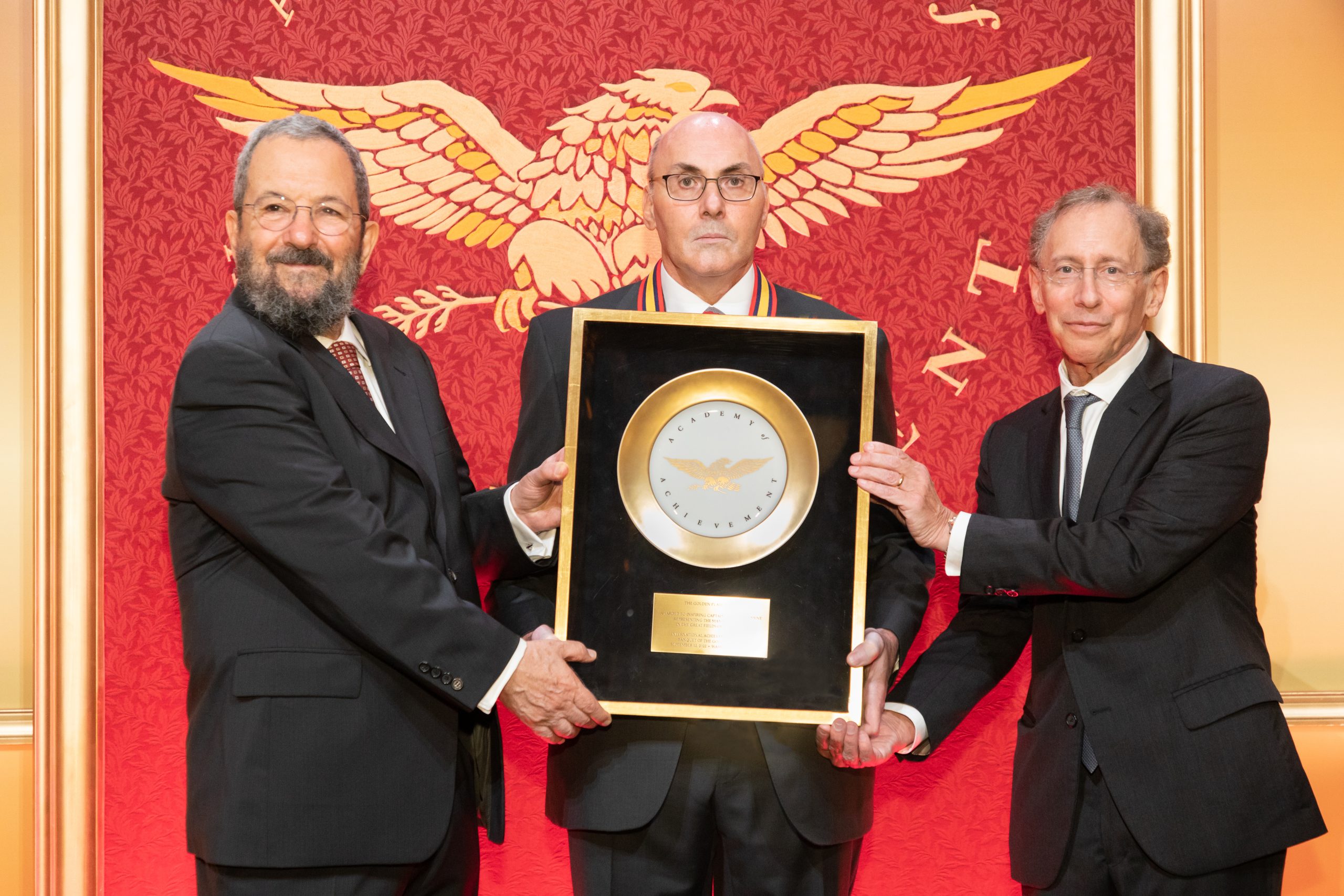
The next Golden Plate Award was presented to Dr. Drew Weissman, who persevered through years of setbacks – alongside Academy member Katalin Karikó – to pioneer messenger RNA technology, the “process that has revolutionized vaccine development and is the backbone of coronavirus vaccines.” This groundbreaking University of Pennsylvania researcher received his Golden Plate from Awards Council members Robert Langer and Prime Minister Ehud Barak.
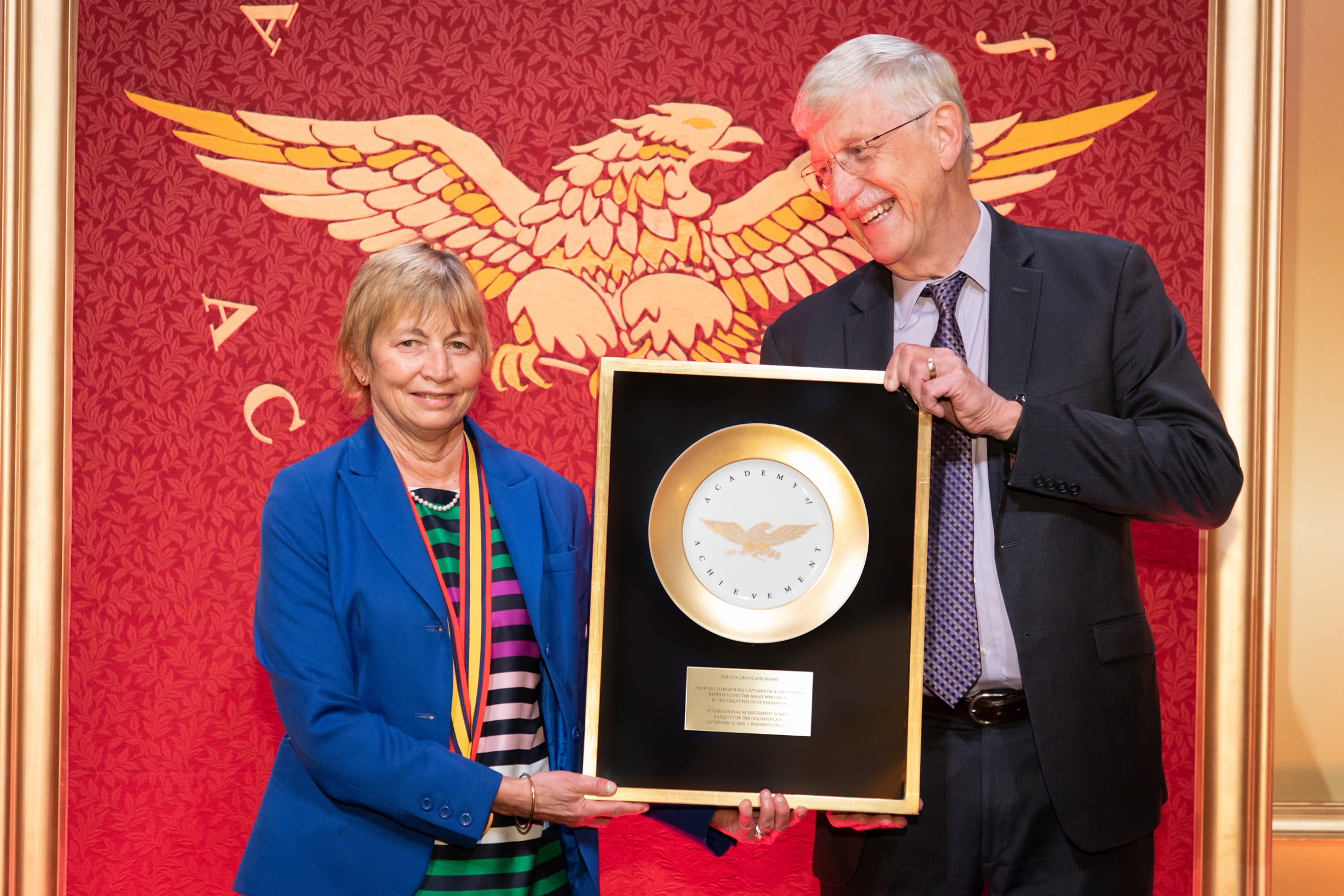
The final award of the Banquet of the Golden Plate ceremonies was bestowed upon the Co-Chair of the President’s Council of Advisors on Science and Technology, Dr. Maria Zuber. The head of Research at MIT, she was presented with the Golden Plate by Awards Council member Dr. Francis Collins, the former Director of the National Institutes of Health.
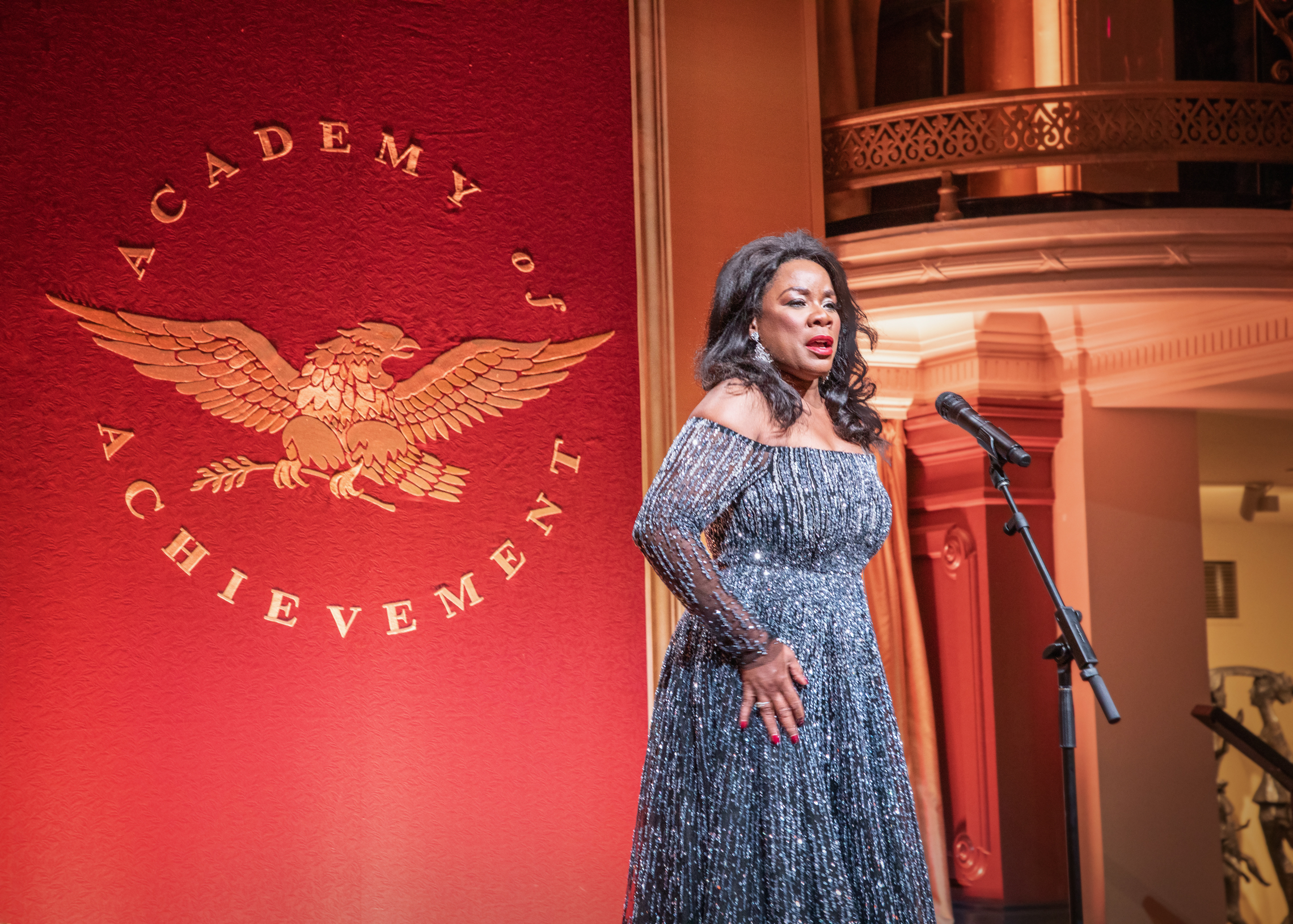
At the close of this year’s Banquet of the Golden Plate ceremonies, Academy members were treated by a performance by Awards Council member and internationally acclaimed mezzo-soprano Denyce Graves.
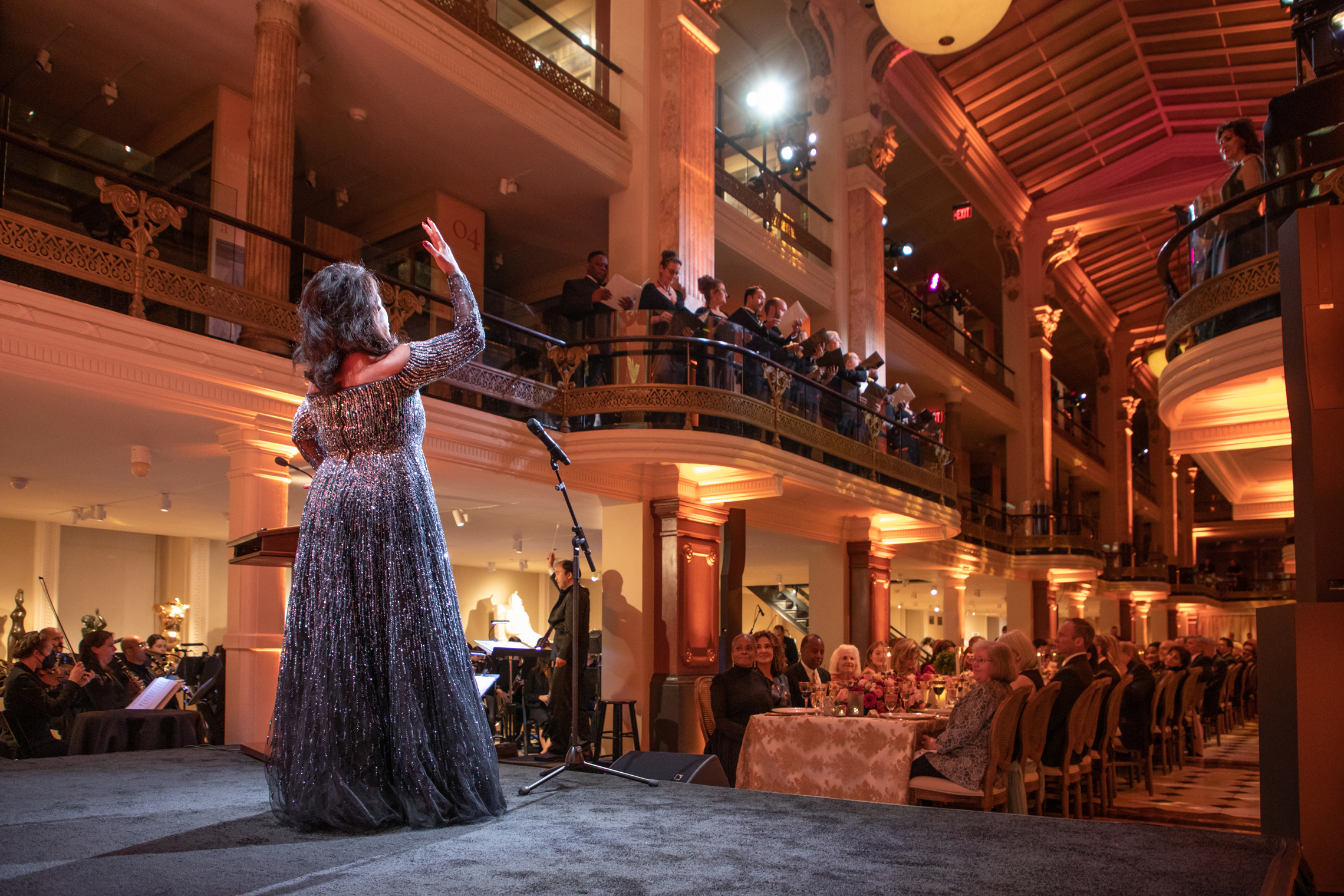
She sang the “Habanera” from Georges Bizet’s opera Carmen, accompanied by the Washington Chamber Orchestra and The Festival Chorus. Denyce Graves concluded the program with a stirring rendition of the “Battle Hymn of the Republic” in tribute to the legacy of President Abraham Lincoln.
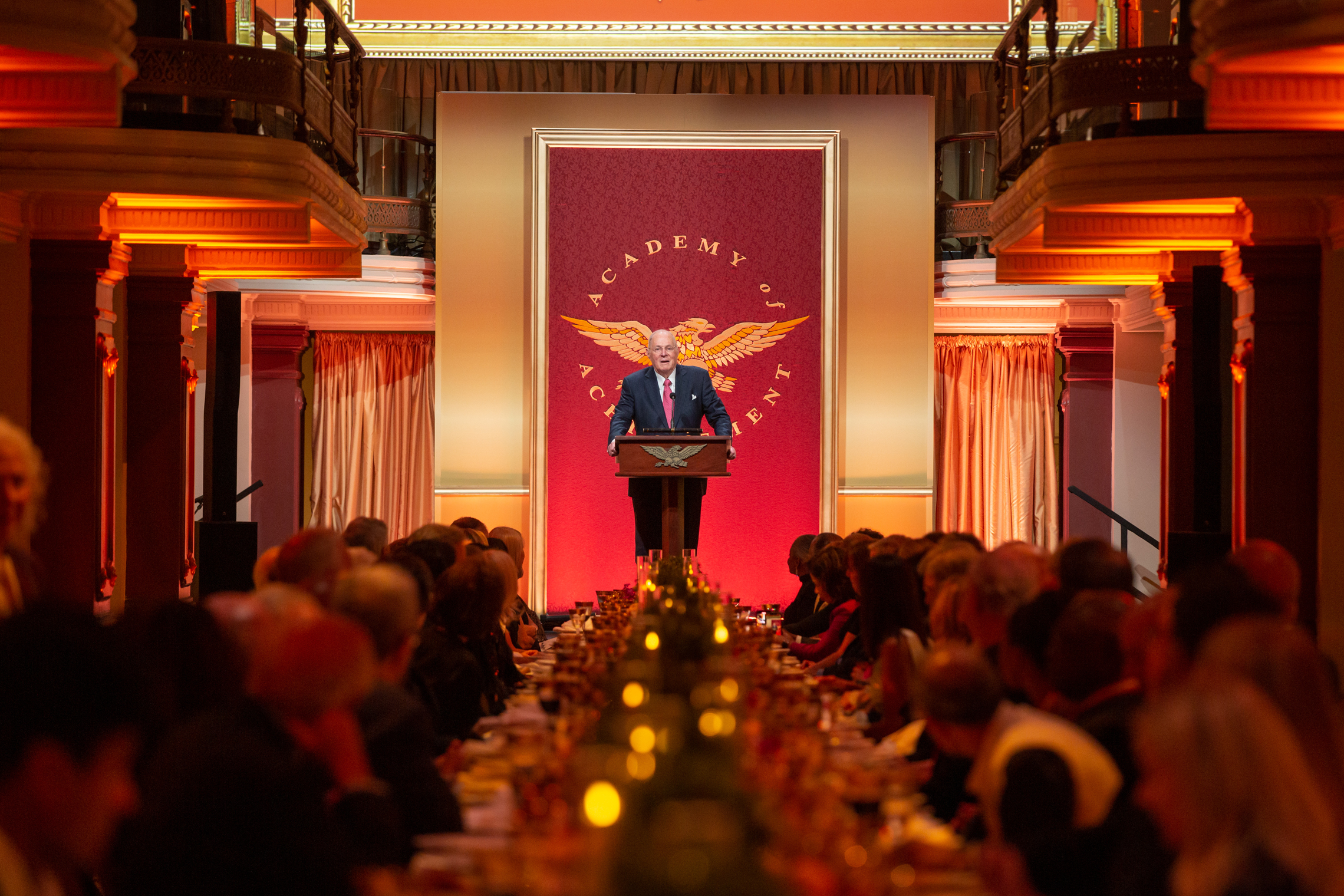
Justice Anthony Kennedy concluded the evening with remarks on the importance of democracy and civil discourse. “We’re here tonight because we have a shared sincerity. We share the same sincerity in wanting to celebrate with the Academy and with Wayne and Catherine. And we want to celebrate freedom. Of course, we have the first obligation to defend freedom, as our distinguished military leaders here remind us by their splendid careers. But freedom also requires us, and this is the sincerity that we share this evening, to celebrate our freedom. And as Wayne and Catherine know, one way to celebrate our freedom is by appreciating art and architecture. And so, this dinner reminds us that one of the things that we’re sincere about celebrating is the art and the beauty that this country, that this nation, that this Constitution, that this system of ours, has been able to produce. And the Reynolds always remind us of that. And they remind us, too, that one of the great hallmarks of freedom is the concord that we have with each other from different views, from different perspectives, but we appreciate each other’s dignity. We appreciate others being persons who, by nature, are entitled to dignity and respect. And this is what the Academy has done. And so, we celebrate freedom by the respect and the enjoyment that we have for each other. For you who are new to the Academy, the honorees, you will be able to do this for many years, just as Mary has joined me in doing it for so many years. You have many, many years to look ahead to being members of this Academy, which is one of the most distinguished institutions in all the United States.”
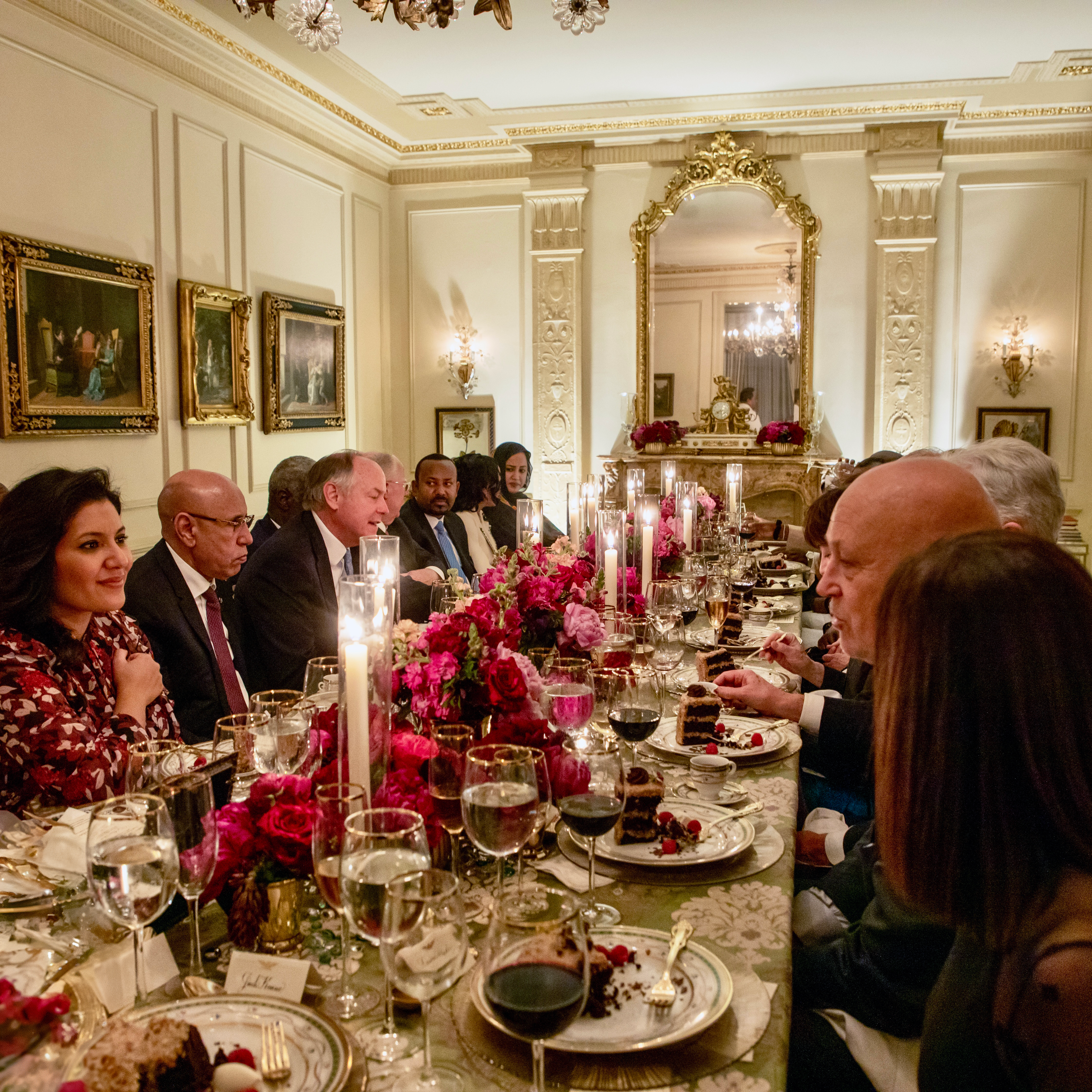
On December 12, on the eve of the U.S.-Africa Leaders Summit, the Academy hosted a dinner and awards ceremony at the Academy of Achievement headquarters in Washington, D.C. They hosted ten African heads of state and inducted seven extraordinary achievers into the Academy’s Class of 2022. Awards Council member Wolf Blitzer introduced the honorees and summarized their accomplishments.
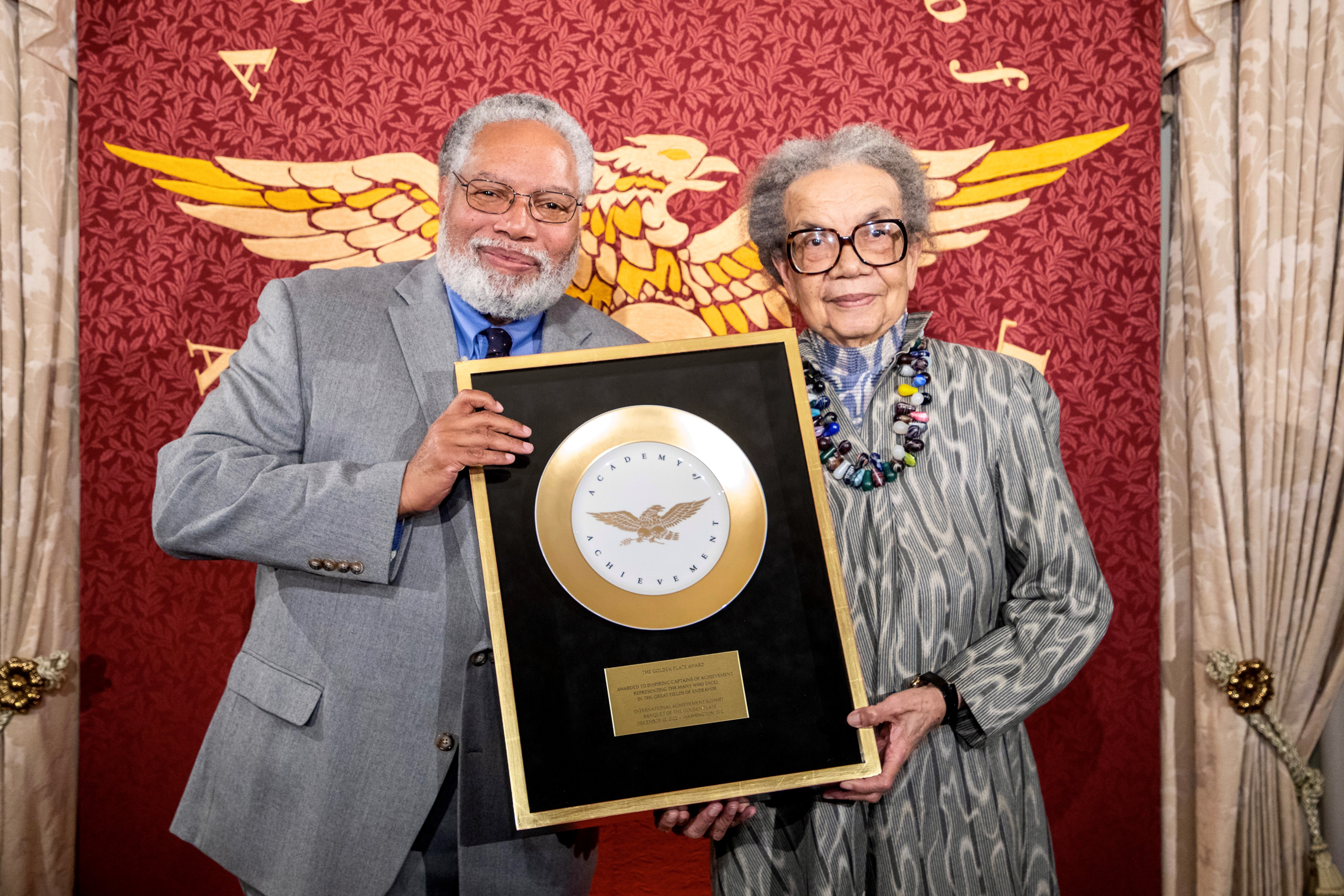
The first Golden Plate Award was presented to Lonnie G. Bunch III, the founding director of the National Museum of African-American History and Culture and the 14th Secretary of the Smithsonian Institution. His introduction read, “The eye of the curator is to see, to reveal, the objects that give life to history. As a boy, he sat at a Woolworth’s lunch counter in Greensboro, NC, when white hands swooped down and placed him in the colored section. As a museum director, he acquired this very same counter where four college students famously staged a sit-in to protest racial segregation.”
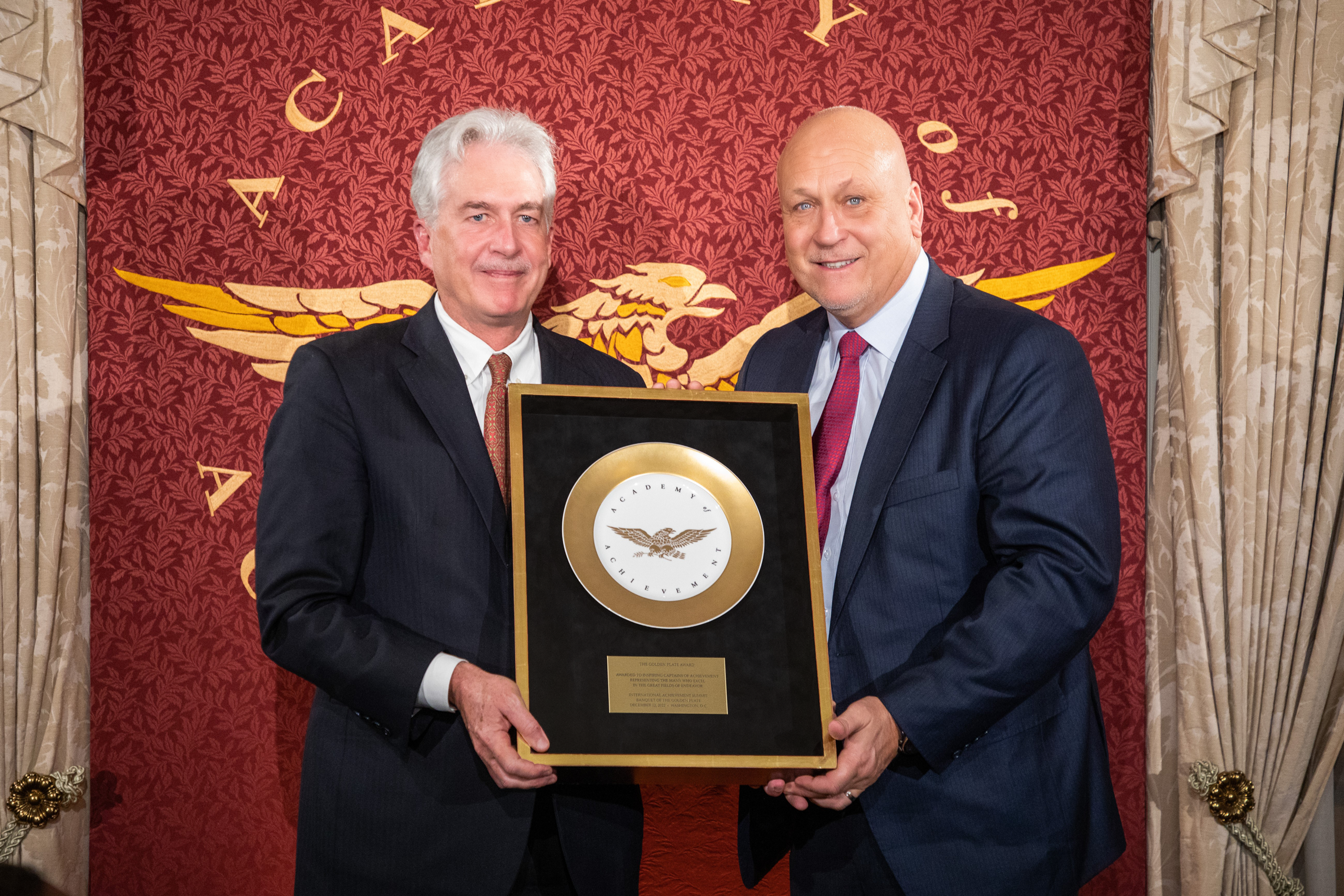
The second Golden Plate was presented to William J. Burns, the Director of the Central Intelligence Agency. His introduction read, “He speaks English, French, Russian and Arabic. But at a dinner party don’t expect him to say much…because, well, he is a spy. As if he wasn’t discreet enough as a decorated career diplomat, he now oversees our nation’s intelligence collection, covert action, and counterintelligence.”
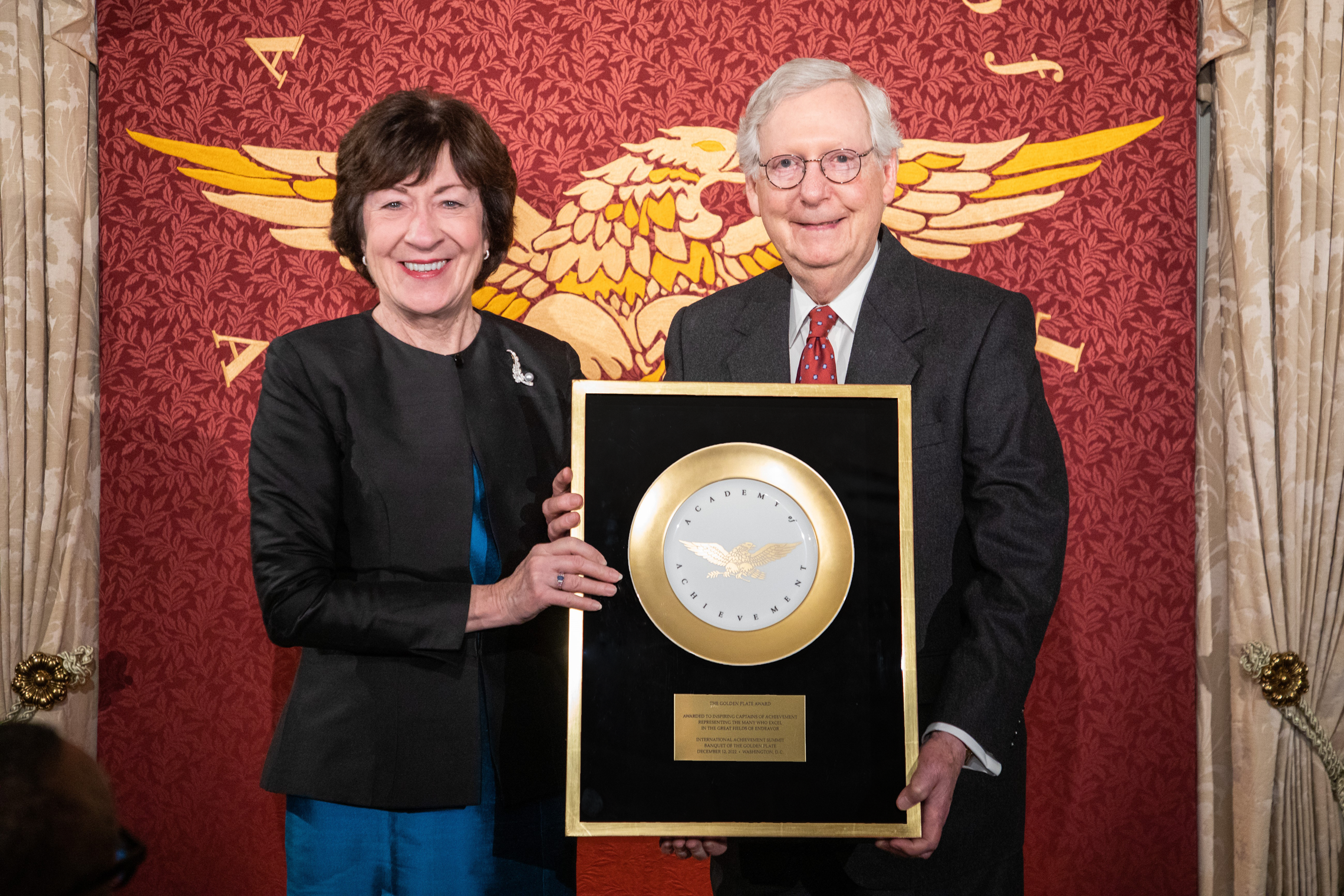
The third Golden Plate was presented to Senator Susan Collins. Her introduction read, “The most famous daughter of Caribou, Maine, the furthermost Northeastern city in the United States…population 7,396…snowfall 118” a year. She felt a sense of community at an early age…her school would close for three weeks in the fall so students could help harvest the potato crop before the freeze set in. From potatoes to politics…elected five times to the U.S. Senate and ranked the most bipartisan member of that body.”
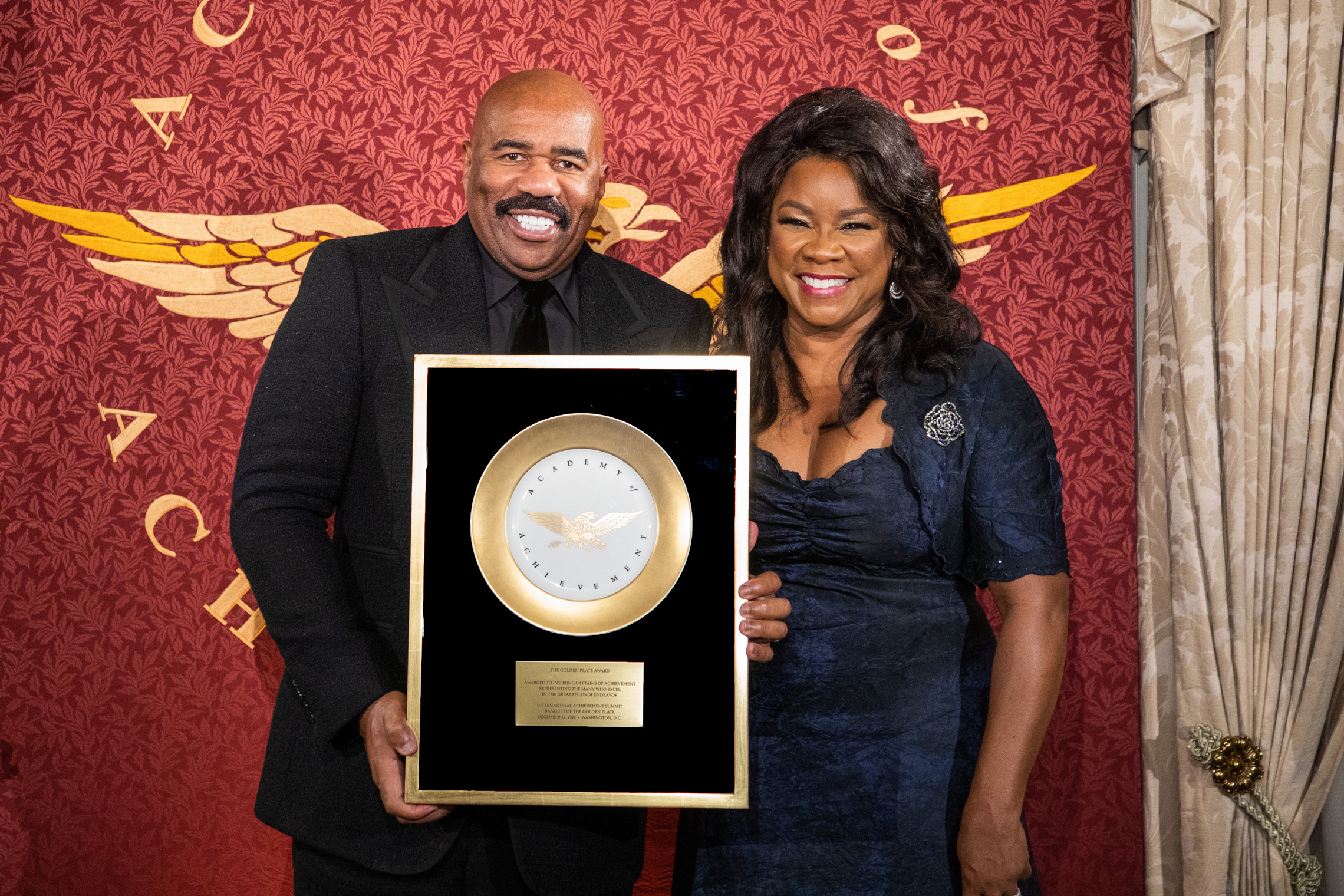
The fourth Golden Plate was presented to television host, producer, actor, and comedian, Steve Harvey. His introduction read, “Achievement. The stuttering son of a coal miner and a Sunday school teacher went on to become a salesman, carpet cleaner and mail carrier before a leap of faith allowed him to become a comedian, he followed his dream and kept his faith even as he fell into homelessness and as a result he went on to become a successful comedian, award-winning TV star, astute producer, transformative businessman and investor, philanthropist and humanitarian who donated 7 tons of personal protective equipment to Covid-stricken Botswana. The first American to adapt a hit U.S. TV show in Africa that went on to become the number one television program in South Africa and Ghana.”
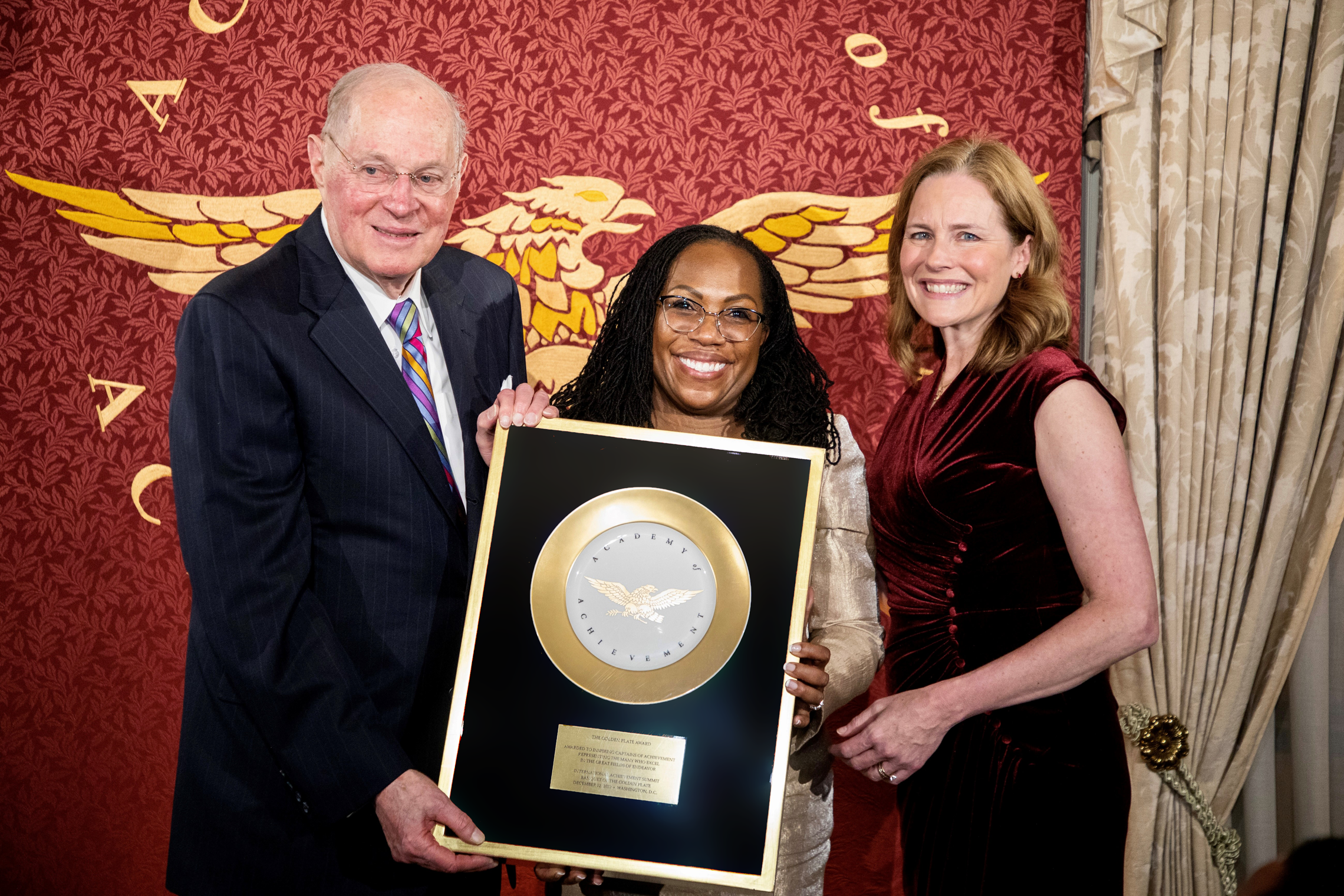
The fifth Golden Plate was presented to U.S. Supreme Court Justice Ketanji Brown Jackson. Her introduction read, “An aunt, serving in the Peace Corps in West Africa, sent the girl’s parents a list of African names. Ketanji Onyika means “lovely one.” Based on the girl’s later achievements, the name also came to mean: smart one…determined one…accomplished one…distinguished one. Harvard magna cum laude, Harvard Law magna cum laude, Harvard Board of Overseers. The first black female justice of U.S. Supreme Court.”

The sixth Golden Plate was presented to Director-General of the WTO Ngozi Okonjo-Iweala. Her introduction read, “Her honors and accomplishments are as varied and many as the colors of an African cloth. This daughter of Nigeria, born into the Obahai royal family of Ogwashi-Ukwu, does not wear a crown. Her mantle of authority are economic degrees from Harvard and MIT; positions as Nigeria’s Finance Minister and Foreign Minister, and as Managing Director of the World Bank. The first woman and the first African to serve as Director-General of the World Trade Organization.” The seventh Golden Plate was presented to the President of Senegal and Chairman of the African Union, Macky Sall. His introduction read, “Trained as a geological engineer and geophysicist, this honoree’s knowledge of humanity’s African homeland goes deep into the Earth. He understands the igneous structure and the molten history that lie below the baobab and the thorn bushes, beneath the savanna and the rainforest. As a public servant, he understands the burning hopes and needs of the people who today walk atop this diverse continent.”

After the Golden Plate Awards presentation, Mr. Miguel Ángel Moratinos, High Representative for the United Nations Alliance of Civilizations, presented ten African heads of state with the Outstanding African Leadership Award.
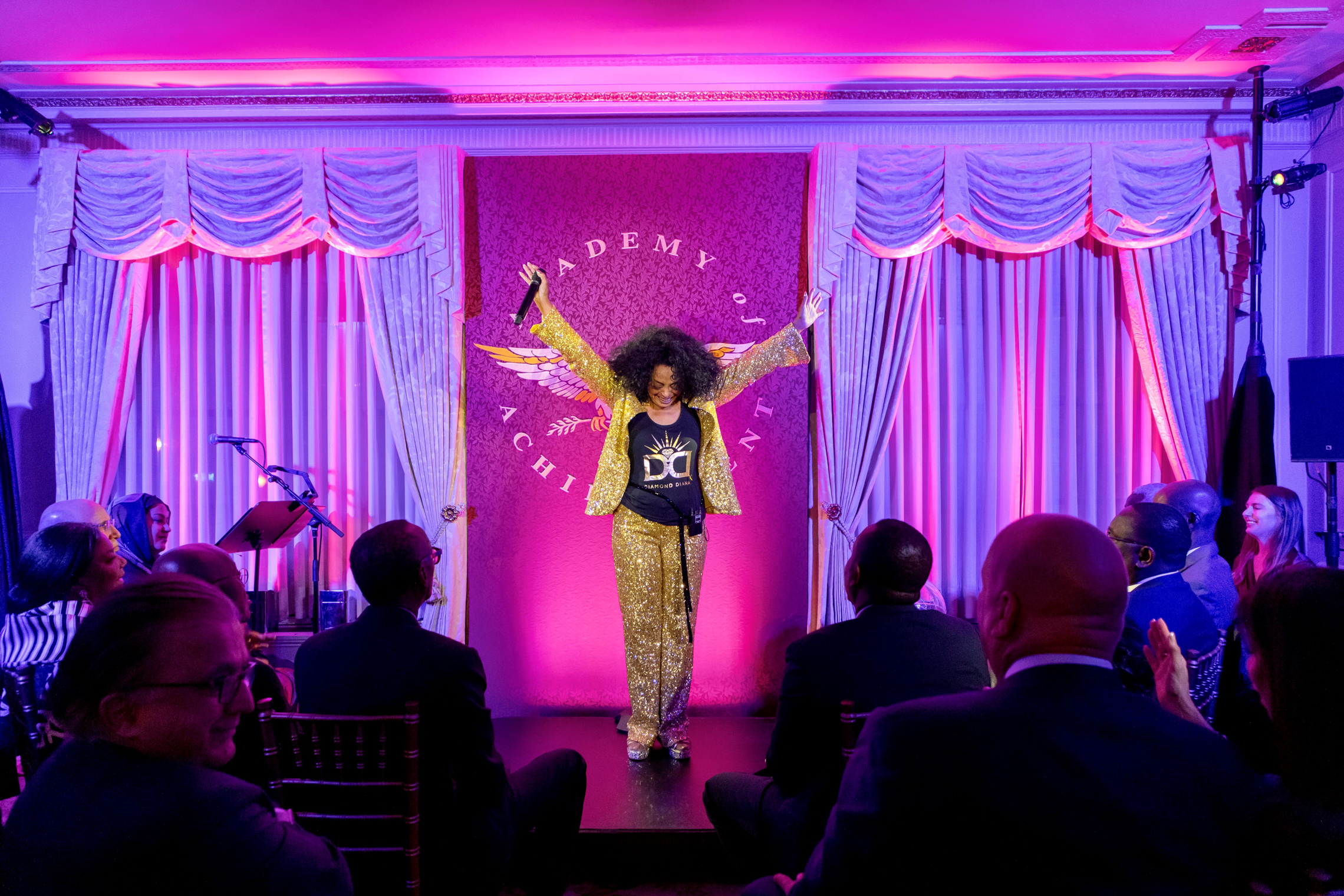
At the close of the awards ceremonies, Academy members were treated by a performance by Academy member and musical icon Diana Ross. Miss Ross sang a selection of her classic hits, including “I’m Coming Out,” “You Can’t Hurry Love,” “Ain’t No Mountain High Enough,” and “Stop in the Name of Love.”
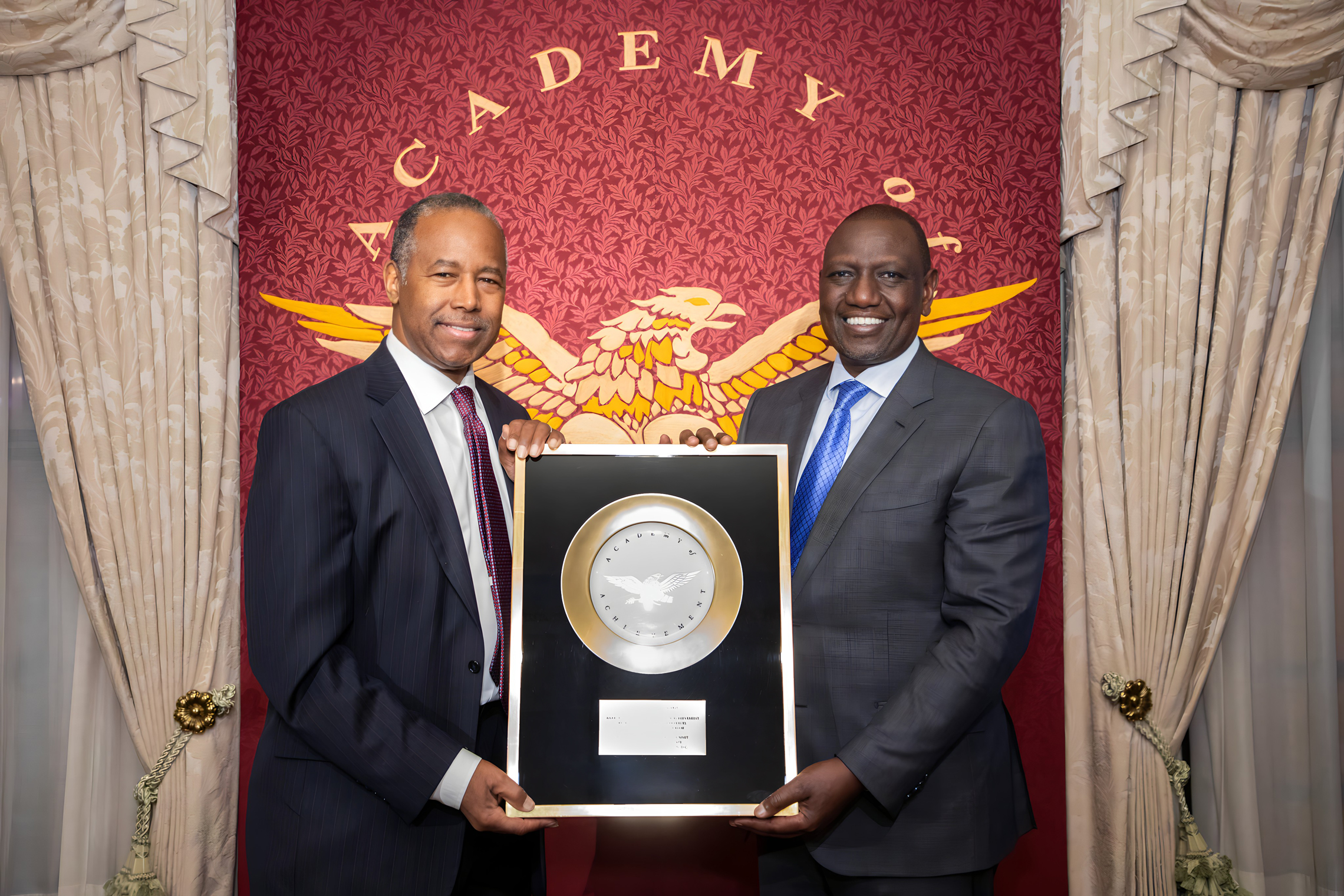
On December 15th, the Academy hosted a dinner in honor of President William Ruto and First Lady of Kenya Rachel Ruto. During the dinner ceremony, the Golden Plate Award was presented to President Ruto by the Academy’s Awards Council members Dr. Ben Carson and General Charles Q. Brown, USAF. The introduction of President Ruto was moderated by Awards Council member Dr. Francis Collins. “Born in a village called Sambut, the barefoot boy sold squawking chickens by the roadside. His school was a one-room mud building with a rusting sheet metal roof. He got his first pair of shoes at the age of 15. A fierce intellect led him to study botany and zoology at the University of Nairobi, where he received a Ph.D. Yet this achiever was not finished. He flourished, and the village boy became a national leader.”
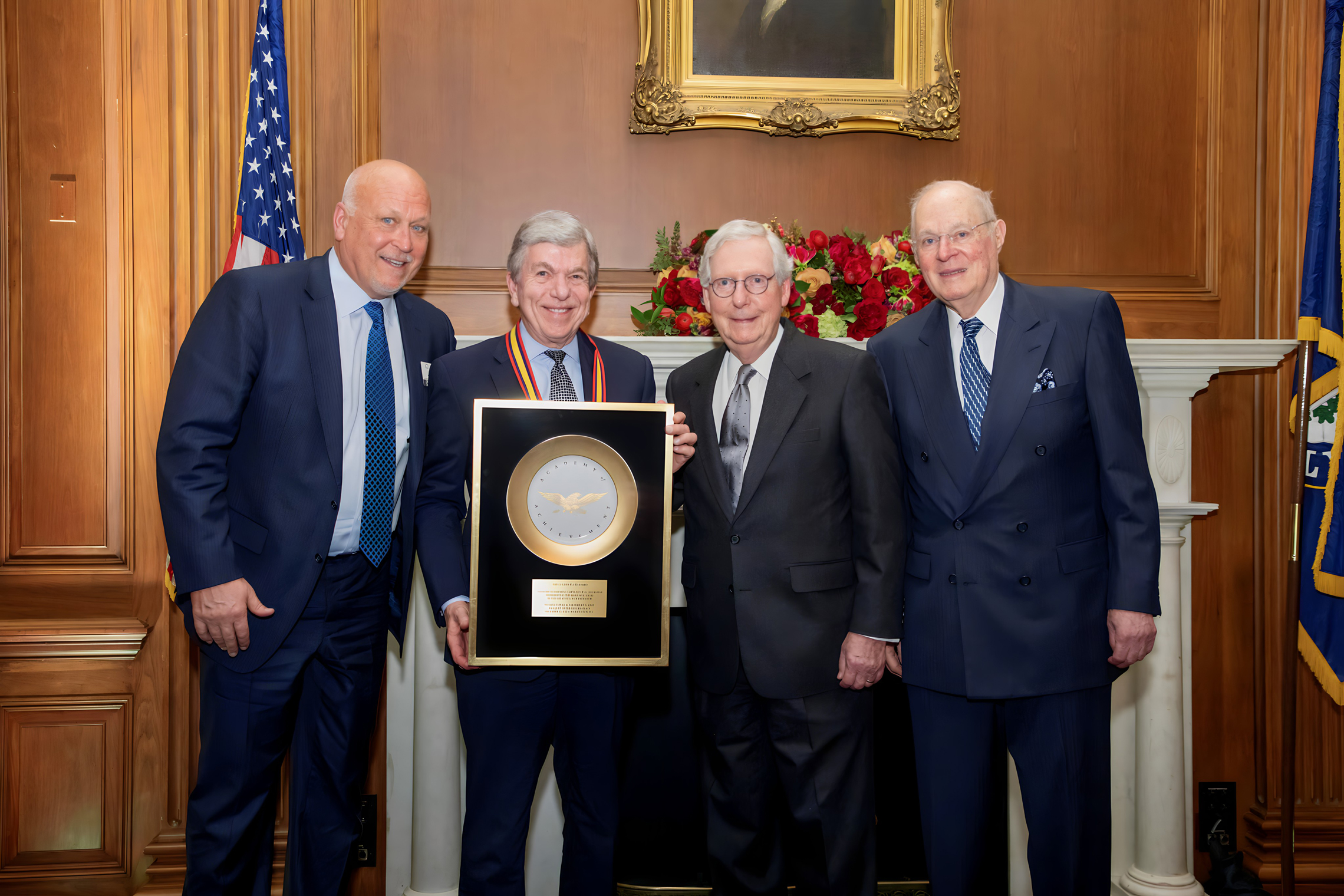
The American Academy of Achievement held a dinner and awards ceremony in the historic Mansfield Room of the United States Capitol to honor Senator Roy Blunt. The occasion was hosted by Senator Mitch McConnell, Academy Class of 2022. Senator Blunt was introduced by U.S. Supreme Court Justice Anthony M. Kennedy, Academy Class of 2005, and the Golden Plate Award was presented by Senator McConnell and baseball immortal Cal Ripken, Jr., Class of 1997.
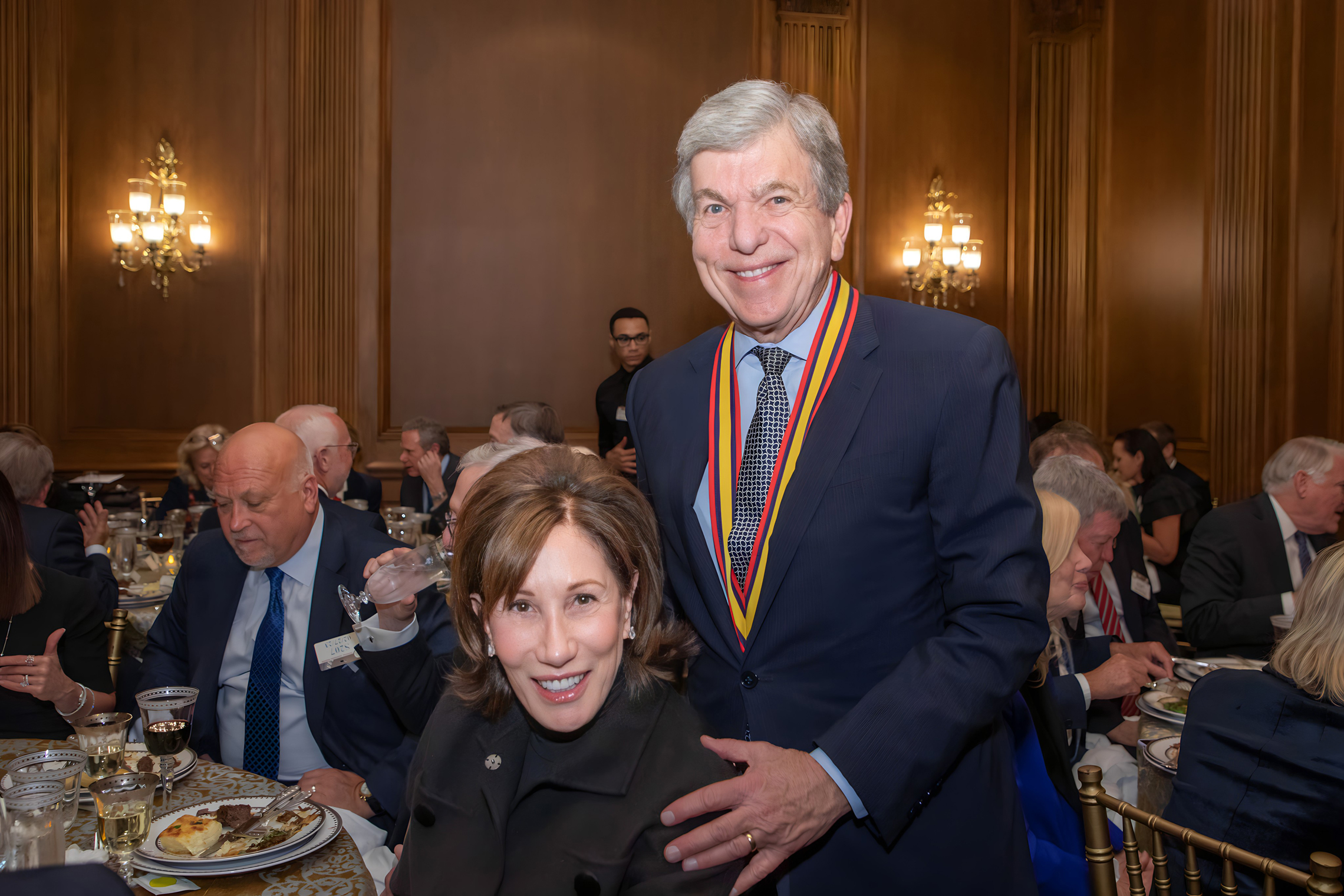
The introduction read, “This son of the Ozarks was born in Niangua (Nigh-ang-gwa), Missouri, population 408. Nigh-ang-gua is variously said to be the name of an Indian tribal leader; an Indian word meaning “bear;” or an old Indian phrase meaning “I will not go away.” Which is the meaning we will choose as it is a fitting description of a budding politician. Our honoree’s rise was worthy of de Tocqueville’s vision of American democracy—Greene County clerk, Missouri Secretary of State, United States congressman, United States Senator . . . a public servant with the courage to reach across the aisle.”
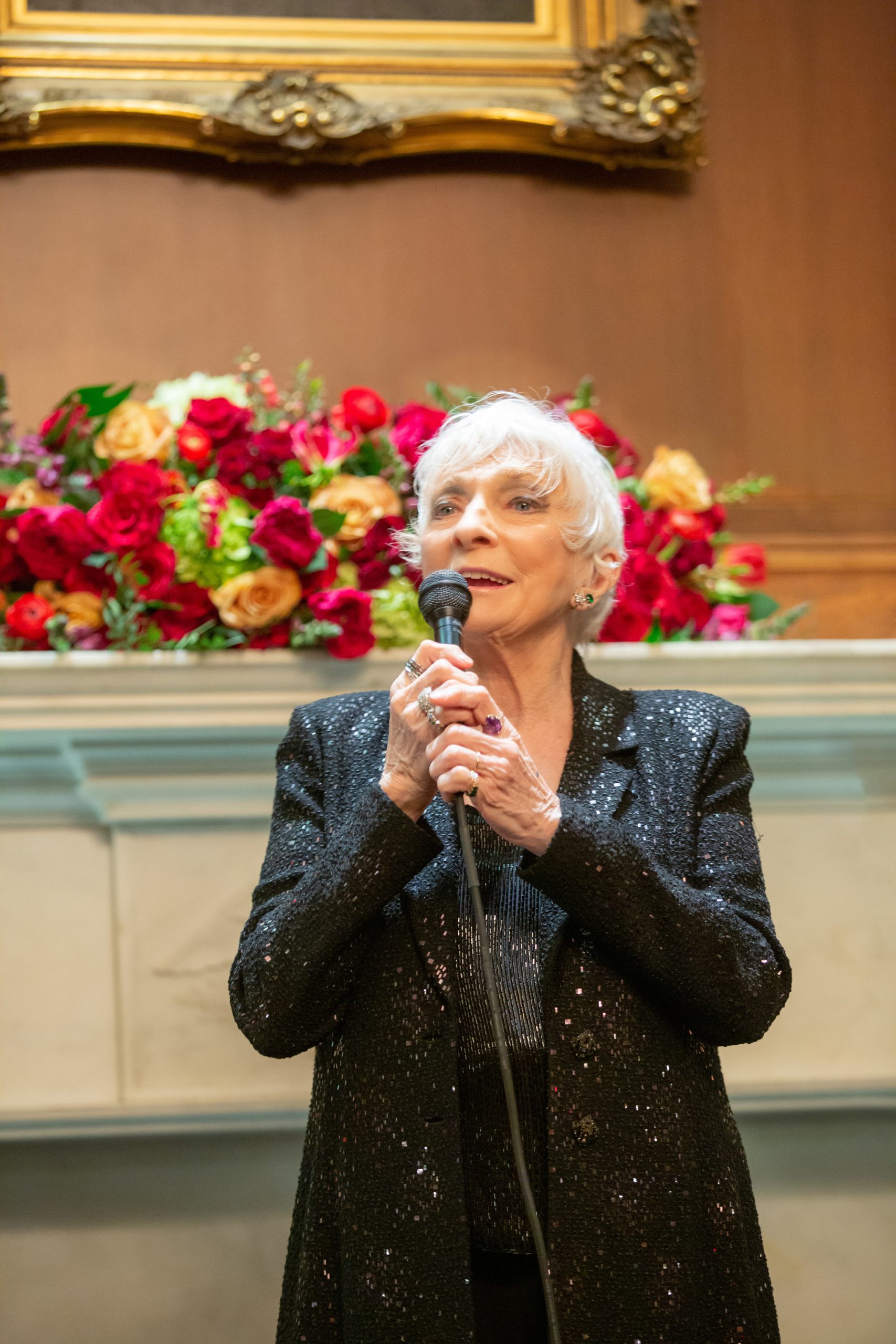
Judy Collins, singer and songwriter and member of the Academy’s Class of 2019, opened the evening program with her rendition of “Amazing Grace.” The introduction read, “A voice of crystal, a heart of gold, and a character of truest steel, forged in the crucible of trying times. Many have sung the song of America, but few singers have lived the meaning of our creed with the grace and passion of this national treasure.”
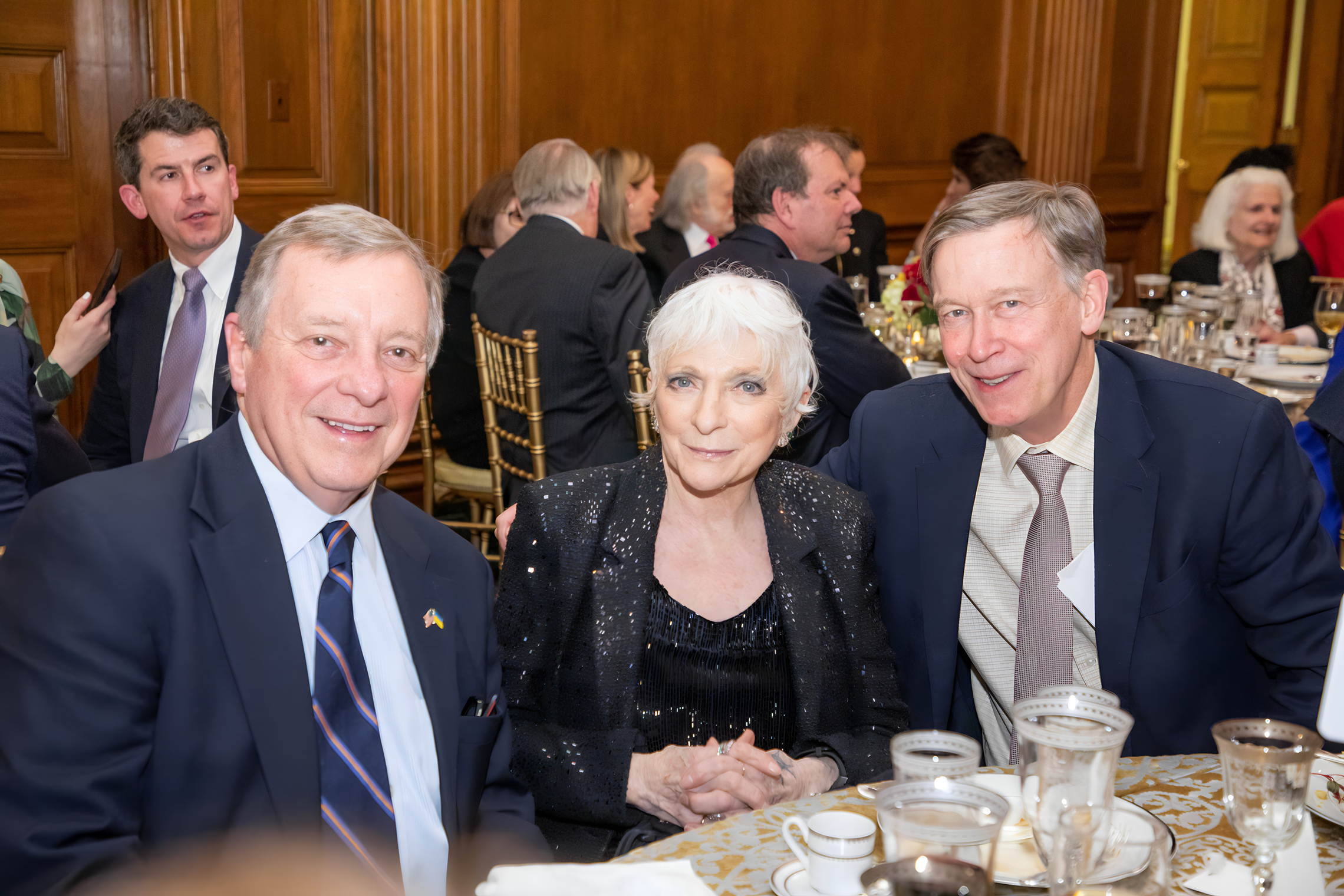
The awards ceremony was followed by a discussion on the future of health and wellness by Dr. Francis Collins, former Director of the National Institutes of Health and American Academy of Achievement’s Class of 1994, and Dr. Anthony Fauci, former Chief Medical Adviser to the President and member of the Academy’s Class of 2003.

